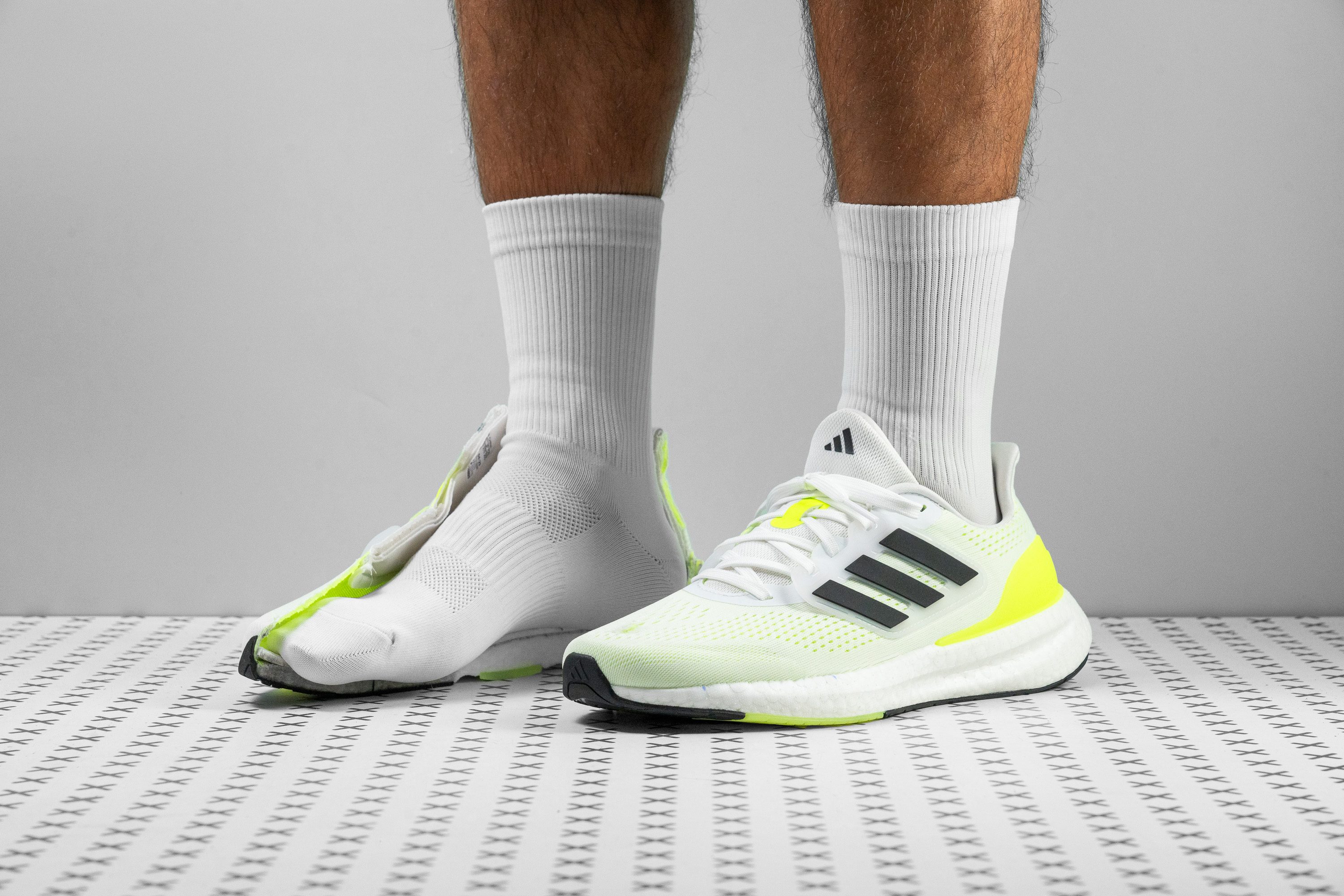Our verdict
Pros
- Breathable and comfortable upper
- Doubles as a casual shoe or gym companion
- Spacious toebox
- Crafted for heel strikers
- Performs excellently in cold weather
- Remarkably stable, even at a easy paces
- Full-length plush Boost midsole
- Excellent energy return
Cons
- Insufficient shock absorption
- Excessively heavy considering its low stack height
- Makes no sense for forefoot strikers
- Poor grip
Audience verdict
- Top 1% in Adidas Boost running shoes
Comparison
The most similar running shoes compared
+ + Add a shoe | |||||
|---|---|---|---|---|---|
| Audience score | 81 Good! | 83 Good! | 88 Great! | 81 Good! | |
| Price | $140 | $140 | $140 | $100 | |
| Pace | Daily running | Daily running | Daily running | Daily running | |
| Shock absorption | Low | - | Moderate | - | |
| Energy return | High | - | Moderate | - | |
| Traction | Moderate | - | Low | - | |
| Arch support | Neutral | Neutral | Neutral | Neutral | |
| Weight lab Weight brand | 10.8 oz / 305g 10.8 oz / 307g | 10.1 oz / 286g 10.4 oz / 295g | 9.9 oz / 281g 10 oz / 283g | 9.7 oz / 274g 10 oz / 283g | |
| Drop lab Drop brand | 11.5 mm 10.0 mm | 11.6 mm 10.0 mm | 11.4 mm 10.0 mm | 12.5 mm 9.0 mm | |
| Strike pattern | Heel | Heel | Heel | Heel | |
| Size | True to size | True to size | True to size | True to size | |
| Midsole softness | Soft | Soft | Soft | Balanced | |
| Difference in midsole softness in cold | Small | Normal | Normal | Small | |
| Toebox durability | Decent | Bad | Decent | Good | |
| Heel padding durability | Good | Good | Good | Good | |
| Outsole durability | Good | Decent | Good | Bad | |
| Breathability | Breathable | Breathable | Moderate | Breathable | |
| Width / fit | Medium | Medium | Medium | Medium | |
| Toebox width | Wide | Medium | Medium | Medium | |
| Stiffness | Flexible | Stiff | Flexible | Stiff | |
| Torsional rigidity | Flexible | Moderate | Flexible | Moderate | |
| Heel counter stiffness | Stiff | Stiff | Stiff | Moderate | |
| Heel lab Heel brand | 27.6 mm 22.0 mm | 33.6 mm 34.0 mm | 33.6 mm 37.0 mm | 30.7 mm 25.0 mm | |
| Forefoot lab Forefoot brand | 16.1 mm 12.0 mm | 22.0 mm 24.0 mm | 22.2 mm 27.0 mm | 18.2 mm 16.0 mm | |
| Widths available | NormalWide | Normal | NormalWideX-Wide | Normal | |
| Orthotic friendly | ✓ | ✓ | ✓ | ✓ | |
| Season | SummerAll seasons | SummerAll seasons | All seasons | SummerAll seasons | |
| Removable insole | ✓ | ✓ | ✓ | ✓ | |
| Ranking | #305 Bottom 20% | #272 Bottom 28% | #128 Top 34% | #299 Bottom 21% | |
| Popularity | #283 Bottom 26% | #186 Top 49% | #10 Top 3% | #318 Bottom 16% |
Who should buy
In our opinion, the Adidas Pureboost 23 emerges as a robust option for:
- Beginners seeking a versatile option that effortlessly transitions between a running shoe and a cozy sneaker.
- Heel strikers on the hunt for a shoe featuring a plush yet thin midsole, complemented by a wide upper.
- Adidas enthusiasts who love the Boost technology and don't mind the additional weight.
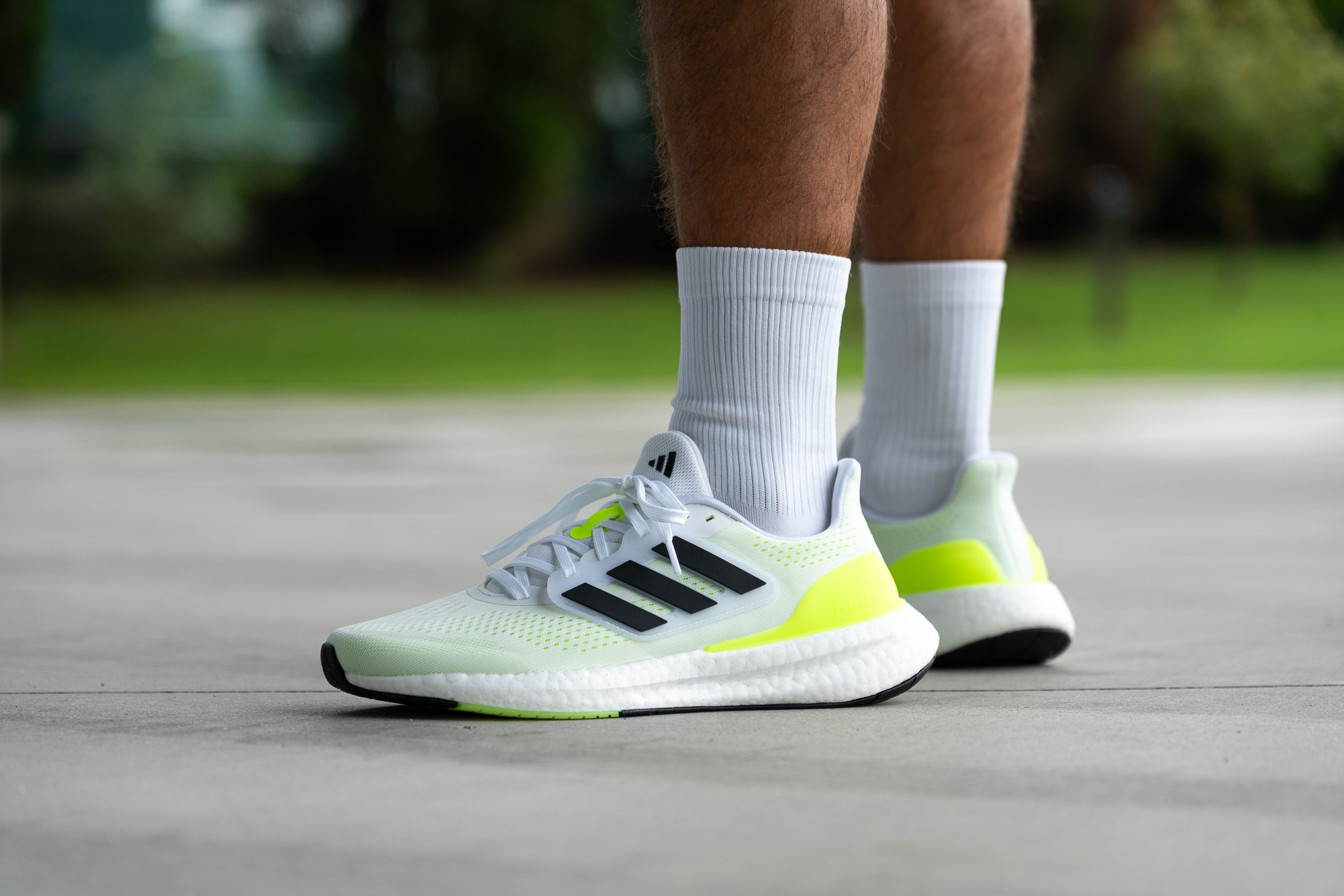
Who should NOT buy
Advanced runners may want to explore other alternatives, as we concluded that the Pureboost 23 falls short in terms of cushioning and responsiveness. Several superior options exist for daily running, including the Nike Pegasus 40, Saucony Triumph 21, and ASICS Novablast 3.
Additionally, the Pureboost 23 has a substantial heel-to-toe drop, making it a bad choice for forefoot strikers. We are convinced that those who favor this running style will do better in shoes with a smaller drop, such as the Saucony Kinvara 14 or the Hoka Clifton 9.
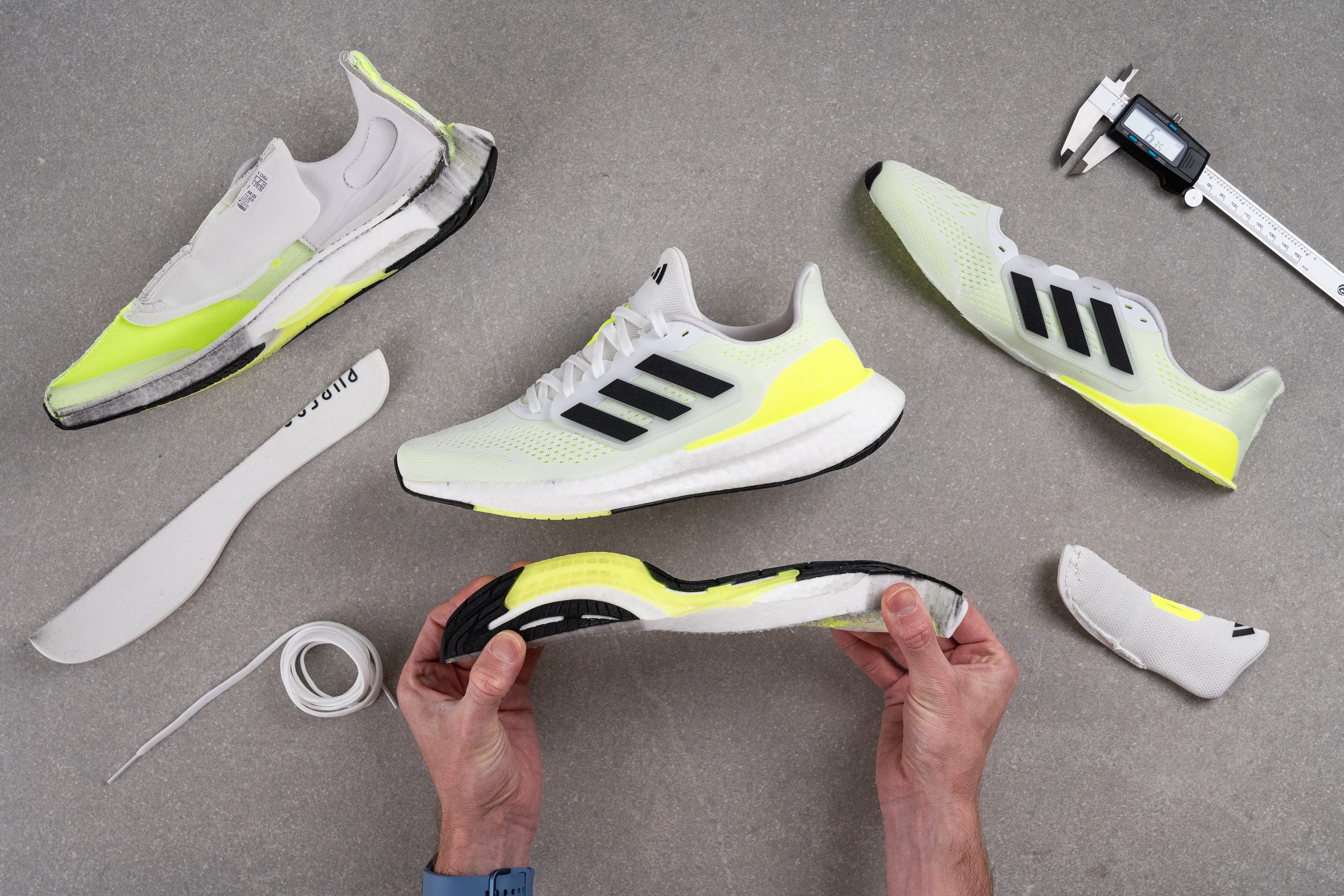
Cushioning
Shock absorption
We believe that the Pureboost 23 is better suited for lightweight runners, as we measured a maximum shock absorption of just 108 SA during our testing. That’s noticeably lower than most running shoes and makes it ideal for those who dislike overly cushioned rides—but that’s where its appeal stops.
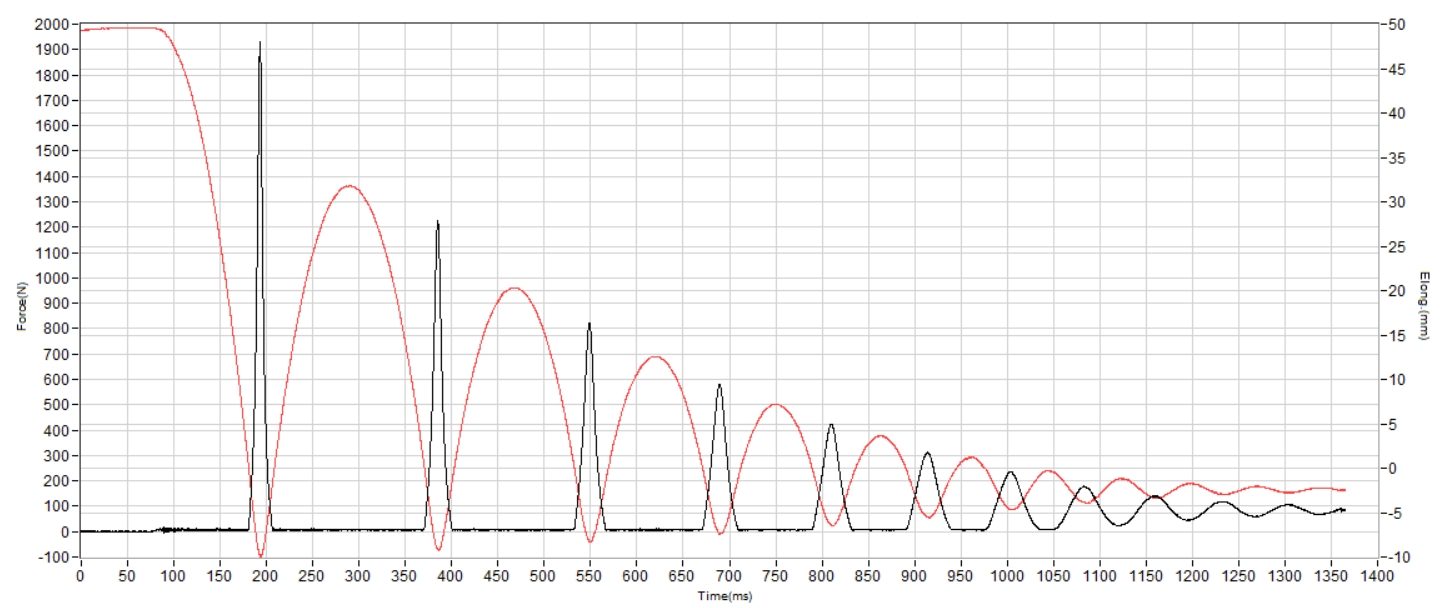
| Pureboost 23 | 108 SA |
| Average | 130 SA |
Energy return
On the flip side, energy return is absolutely impressive at 69.5%, reaching levels that brush against super shoe territory.
That’s the magic of Boost, a TPU-based compound that’s undeniably a bit heavy, yet delivers super-charged rebound far beyond what average EVA can offer.
| Pureboost 23 | 69.5% |
| Average | 58.6% |
Heel stack
We discovered a heel stack height of 27.6 mm, which appears adequate for short to medium-distance runs. However, it evidently falls short in providing sufficient cushioning for long runs or for individuals with a heavier build.
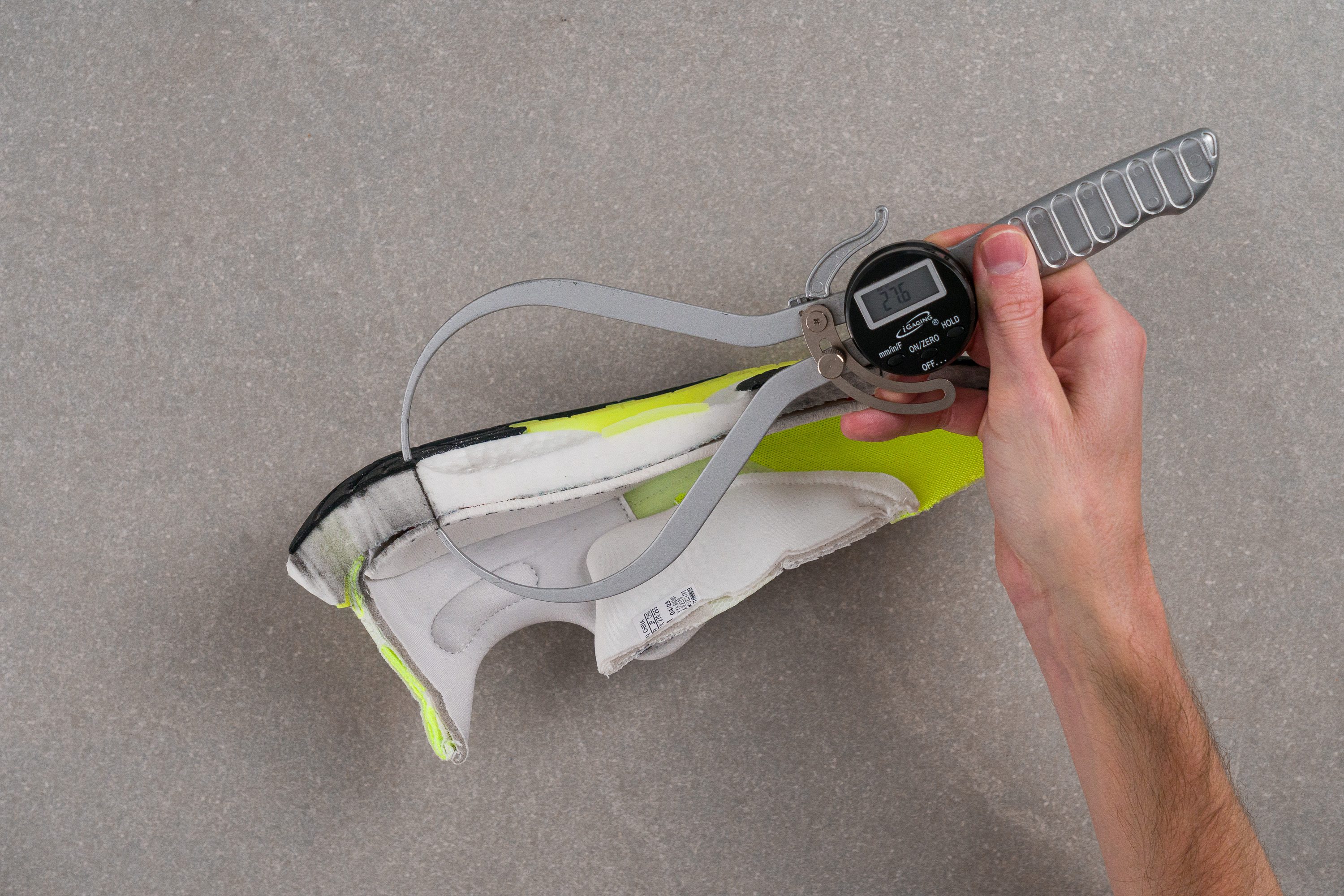
| Pureboost 23 | 27.6 mm |
| Average | 34.8 mm |
Forefoot stack
The forefoot prompted us to double-check our measurement—it seemed unreal. With a mere 16.1 mm of cushioning, this ranks among the least cushioned shoes we've tested in the lab.
As a result, we find it hard to endorse this shoe for serious runners who strike the ground with their forefoot. We think that Adidas opted for less foam due to the shoe's overall weight constraints.
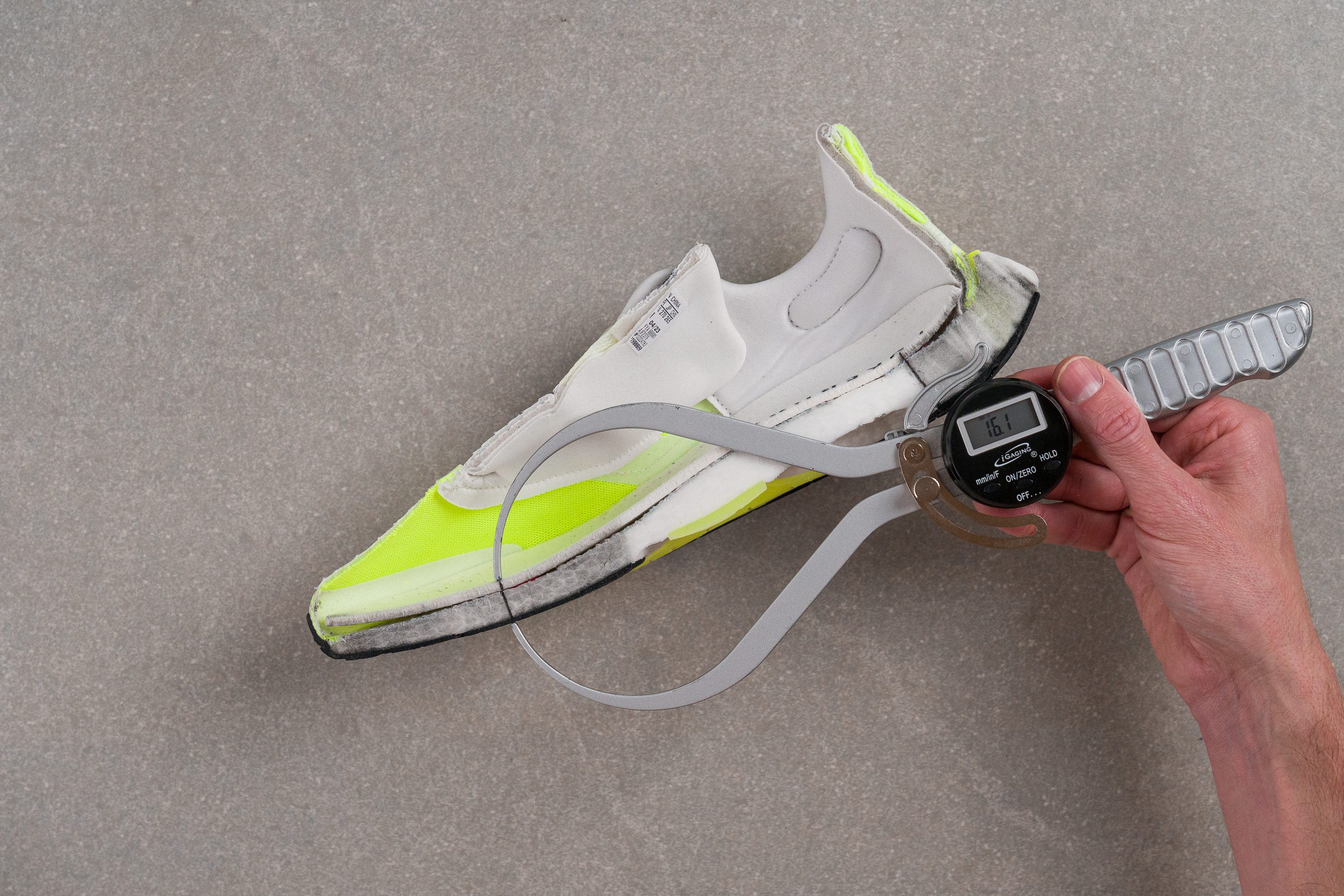
| Pureboost 23 | 16.1 mm |
| Average | 26.2 mm |
Drop
Adidas promotes the Pureboost 23 as having a 10-mm heel-to-toe drop. Yet, our detailed measurements reveal a different fact—we find an 11.5-mm difference between the heel and the forefoot.
This finding further supports the idea that the shoe is primarily designed for heel strikers.
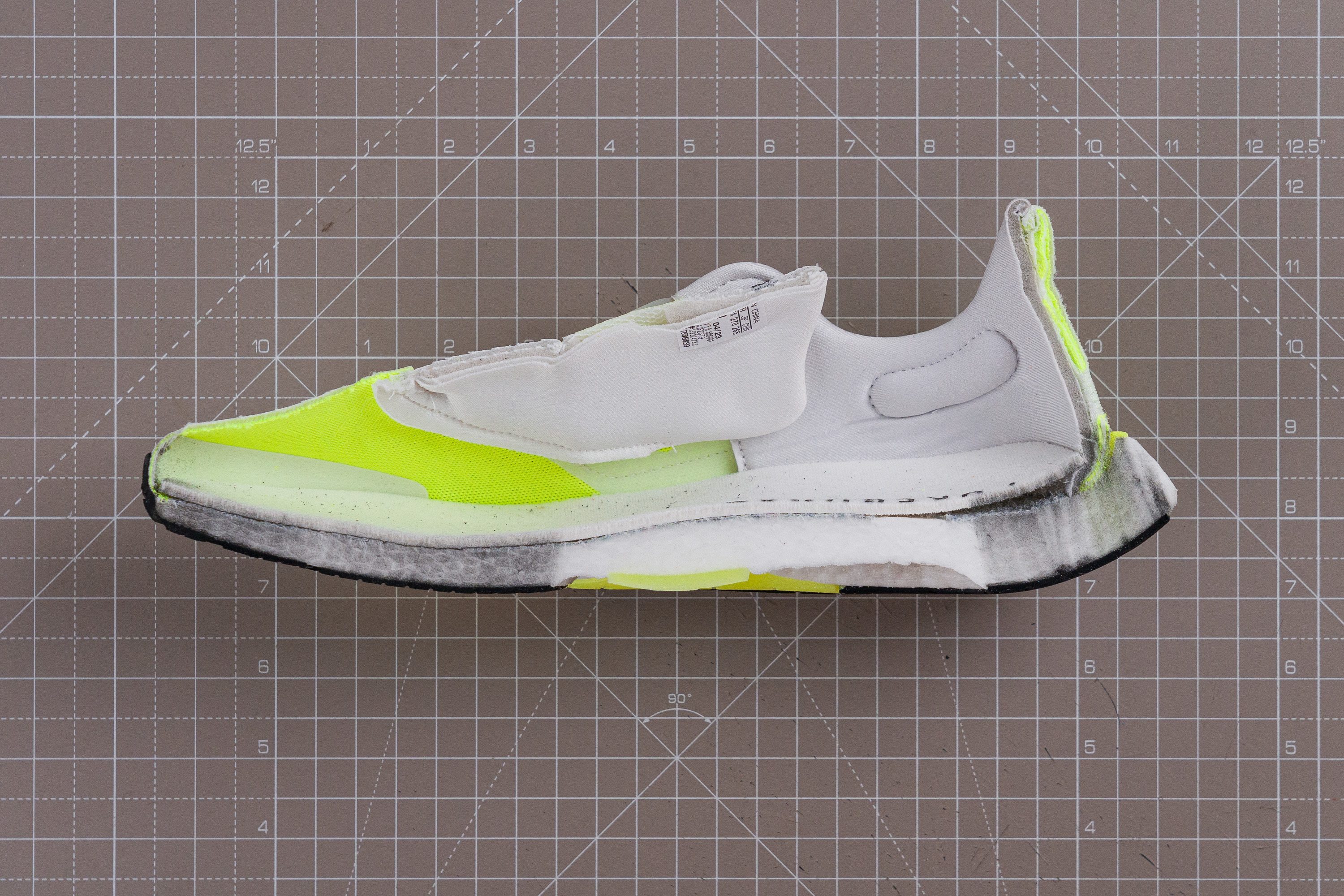
| Pureboost 23 | 11.5 mm |
| Average | 8.6 mm |
Midsole softness
Moving to the Boost midsole, we discovered its remarkable softness, registering at just 13.5 HA.
Even though Boost technology, a decade old, has transitioned from running shoes to sneakers, it continues to provide a comfortable and enjoyable ride!
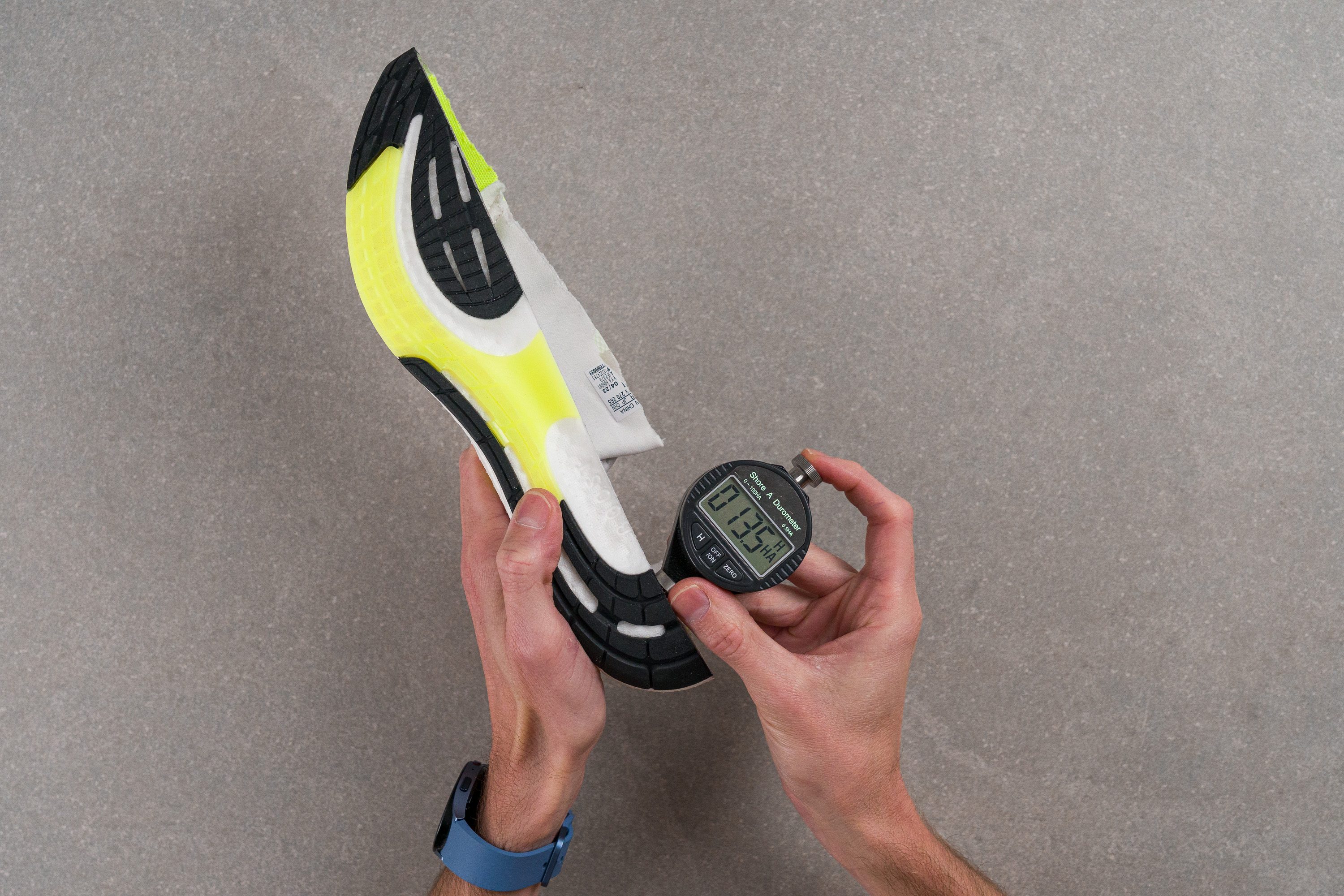
| Pureboost 23 | 13.5 HA |
| Average | 20.4 HA |
Size and fit
Size
Adidas Pureboost 23 fits true to size (21 votes).
Internal length
| Pureboost 23 | 270.9 mm |
| Average | 269.4 mm |
Width / Fit
This shoe is a dream come true for those with wide feet.
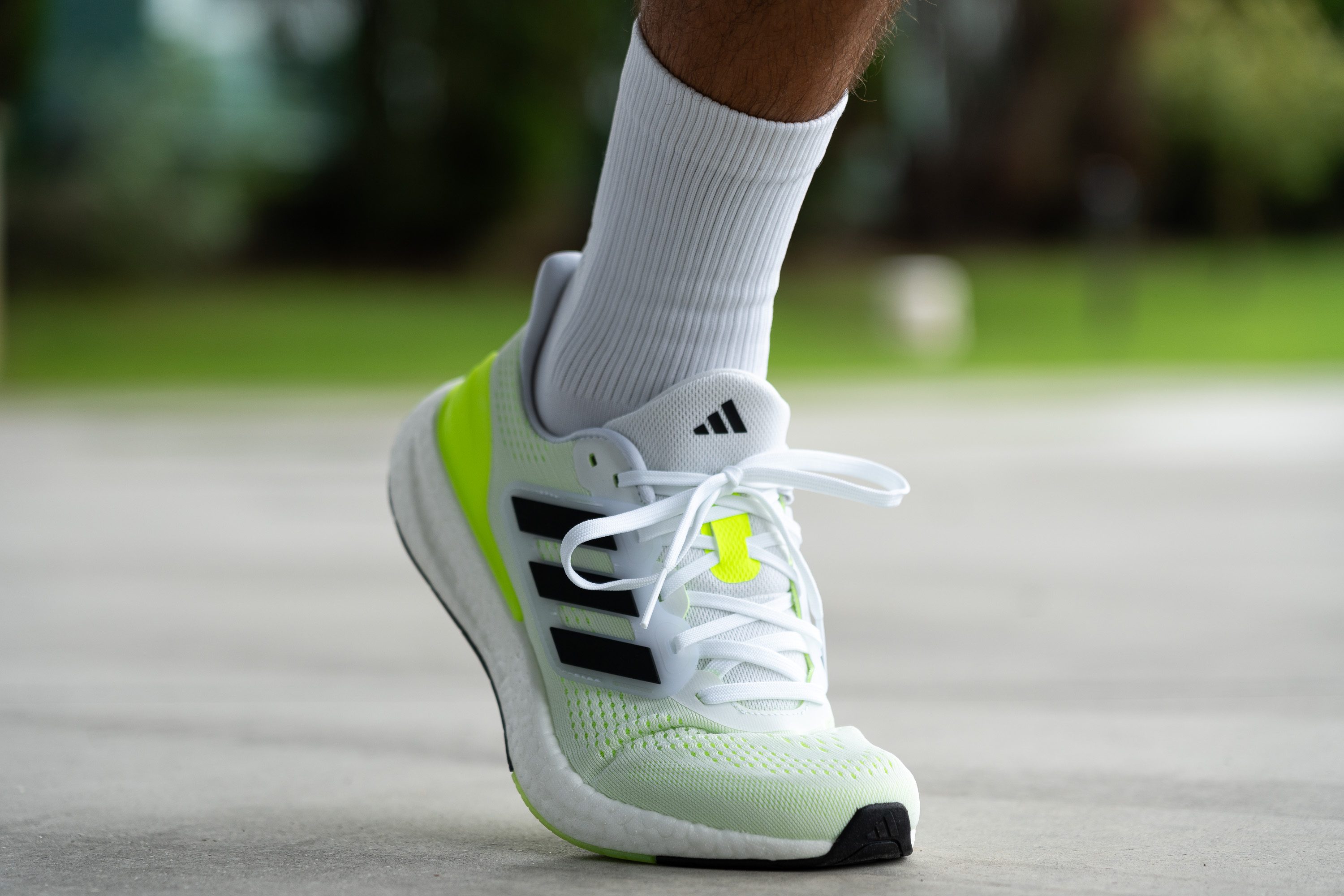
After testing and measuring the toebox, we found it to be exceptionally accommodating. The measurement at the widest part clocked in at 102.4 mm.
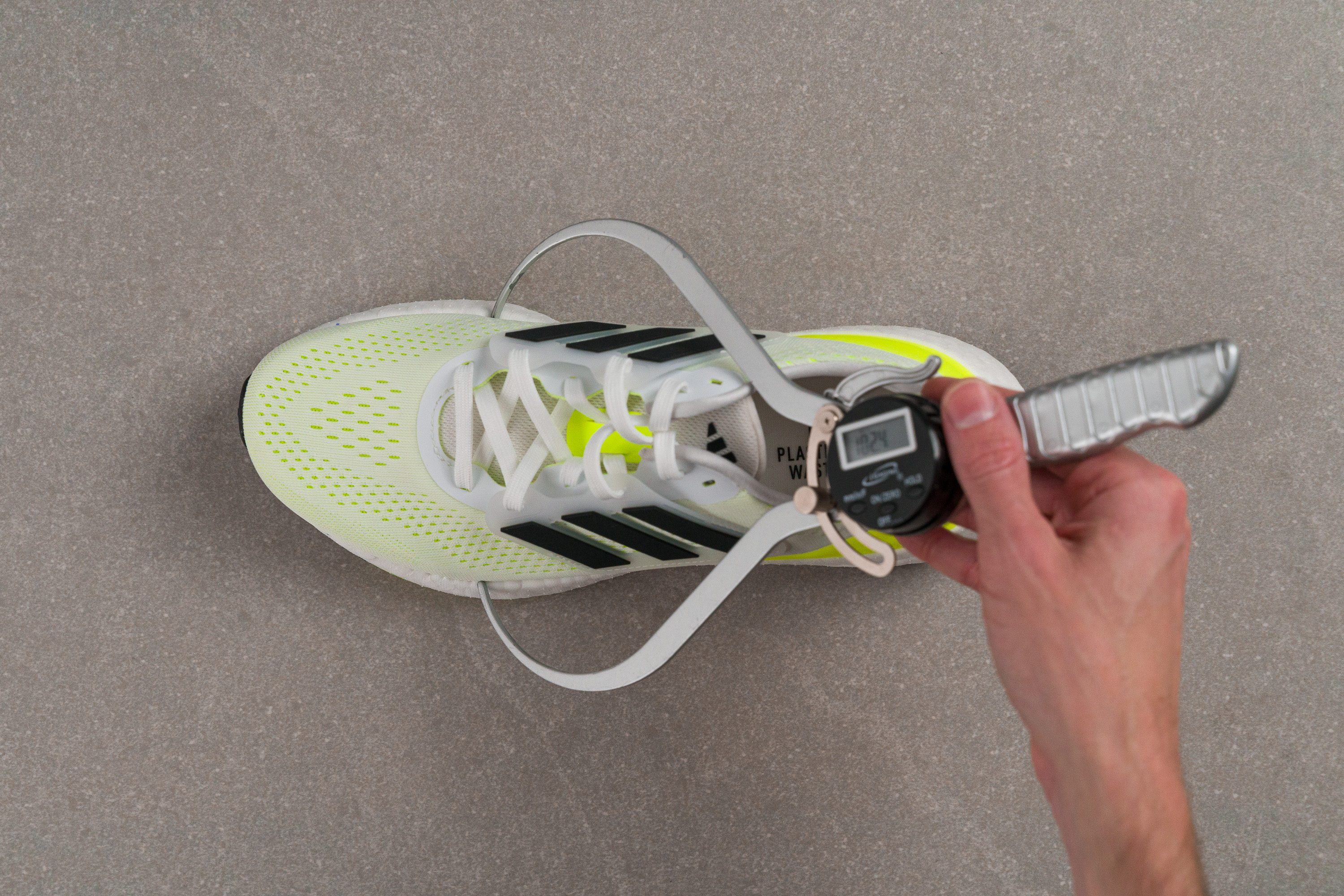
This test follows an older methodology, which is why you don't see recently tested shoes in the chart. Results from different methodologies can not be compared.
| Pureboost 23 | 102.4 mm |
| Average | 98.5 mm |
Toebox width
The spacious area for the big toe is also notably generous, measuring at an impressive 80.4 mm, which is wider than most running shoes.
While this design might not suit those with narrow feet, everyone else will delight in the comfortable and accommodating upper.
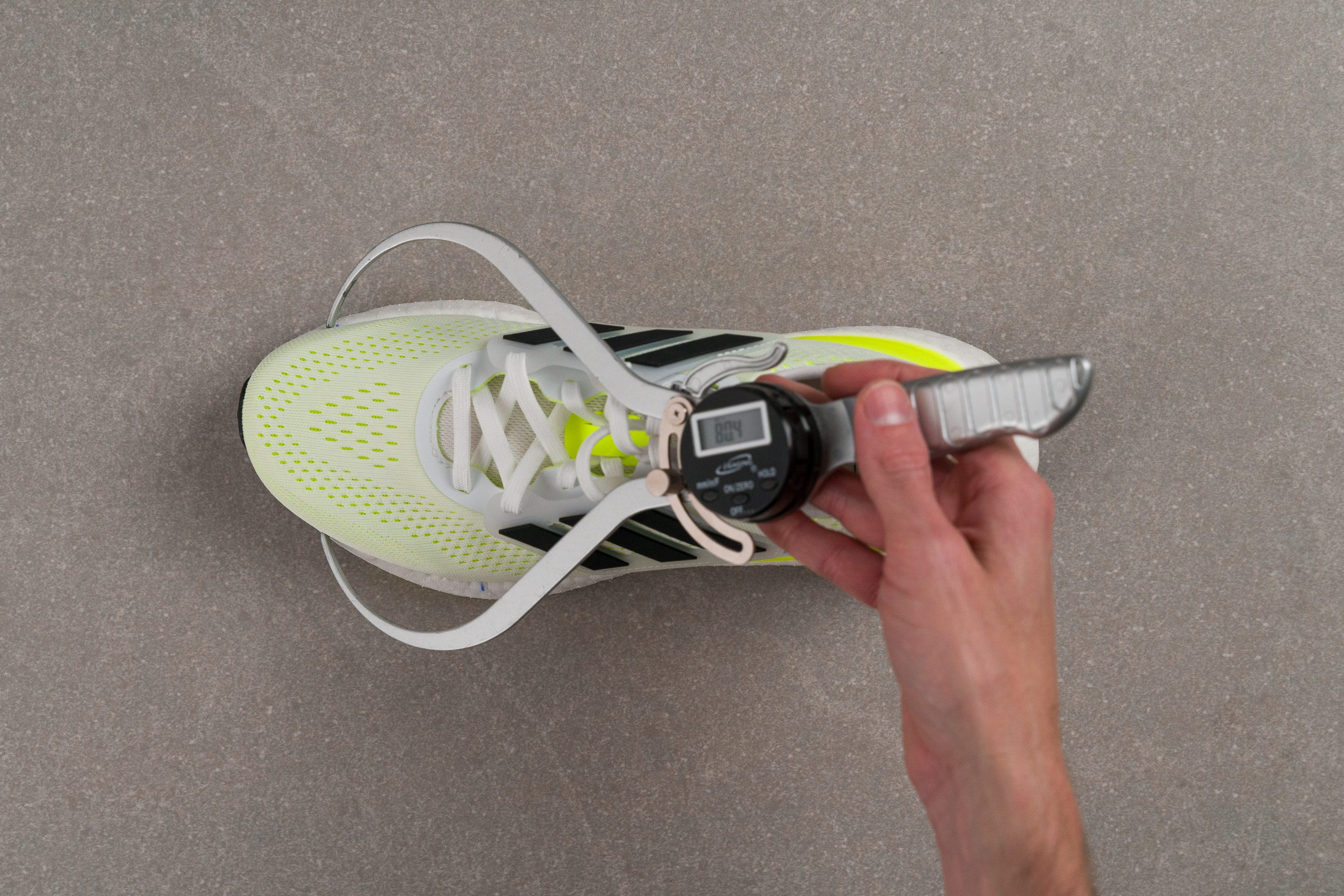
This test follows an older methodology, which is why you don't see recently tested shoes in the chart. Results from different methodologies can not be compared.
| Pureboost 23 | 80.4 mm |
| Average | 78.4 mm |
Traction / Grip
Traction test
Regrettably, this shoe skips the Continental rubber often praised for its top-tier grip. As we feared, it underperformed in our traction test—scoring just 0.28. It’s fine for dry roads, but slips too easily in wet conditions.
| Pureboost 23 | 0.28 |
| Average | 0.49 |
Outsole design
The Adidas Pureboost 23 features a full-contact rubber outsole split into three main zones. It uses a mix of segmented pods and linear grooves that wrap around the heel and forefoot.
Rubber coverage is quite extensive, especially considering the shoe's lifestyle-meets-running purpose. The cutout in the midfoot helps reduce a bit of weight while exposing some Boost foam, a familiar design cue for Adidas.
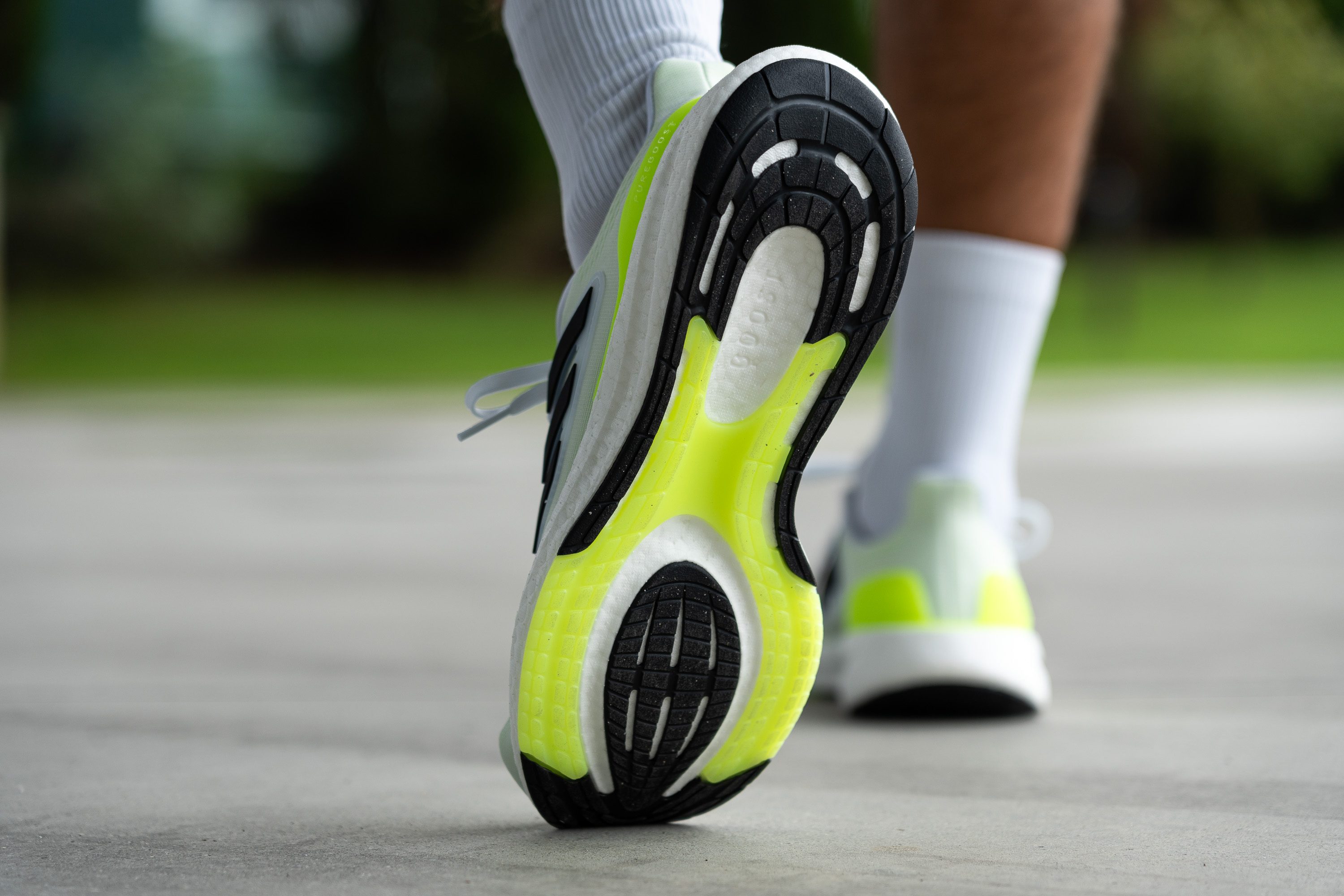
Flexibility / Stiffness
Upon twisting the shoe, we immediately noticed its extreme flexibility, making us eager to conduct our signature 30-degree bend test. And as anticipated, a mere 7.5N of force was required to bend the shoe to the measurement point, affirming its mind-blowing flexibility and comfort for daily activities.
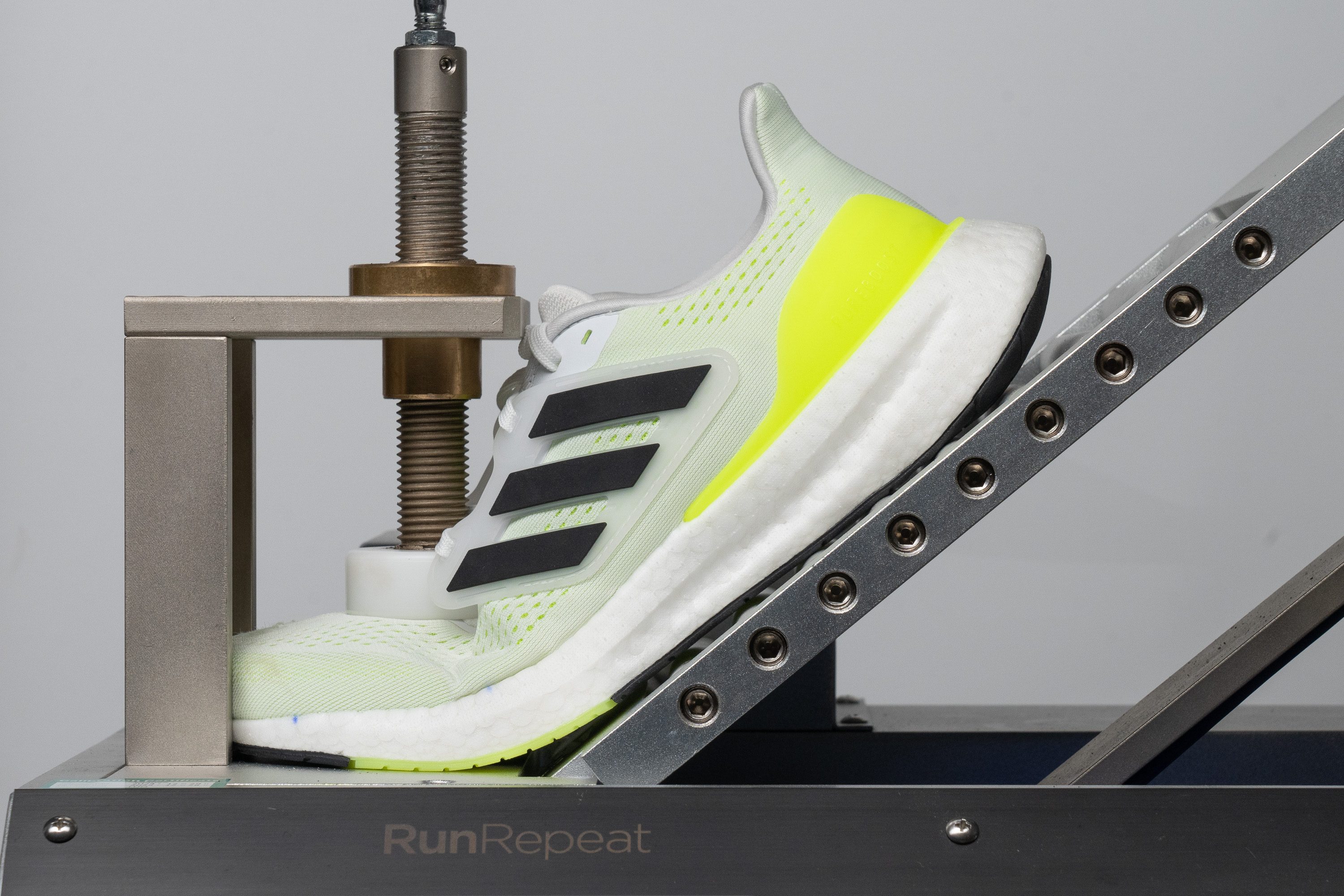
| Pureboost 23 | 7.5N |
| Average | 15.3N |
Stiffness in cold (%)
The most impressive aspect is that this incredible flexibility remains consistent even on the coldest days of the year.
After placing the shoe in the freezer for an additional 20 minutes, we conducted the experiment again and observed a 15.0N reading.
With just an 11.9% increase, the Pureboost 23 stands out in this regard. Few other shoes, many of which are more expensive than this one, can boast such exceptional performance when temperatures plummet.
| Pureboost 23 | 12% |
| Average | 33% |
Weight
Weighing in at 10.8 oz or 305g, this shoe can hardly be considered lightweight. The use of Boost foam, known for being among the heaviest in the industry, is the main culprit here.
Perhaps Adidas will introduce a more streamlined Pureboost Light in the future, featuring the same foam we experienced in the Ultraboost Light. However, for the time being, this is what we have to contend with.
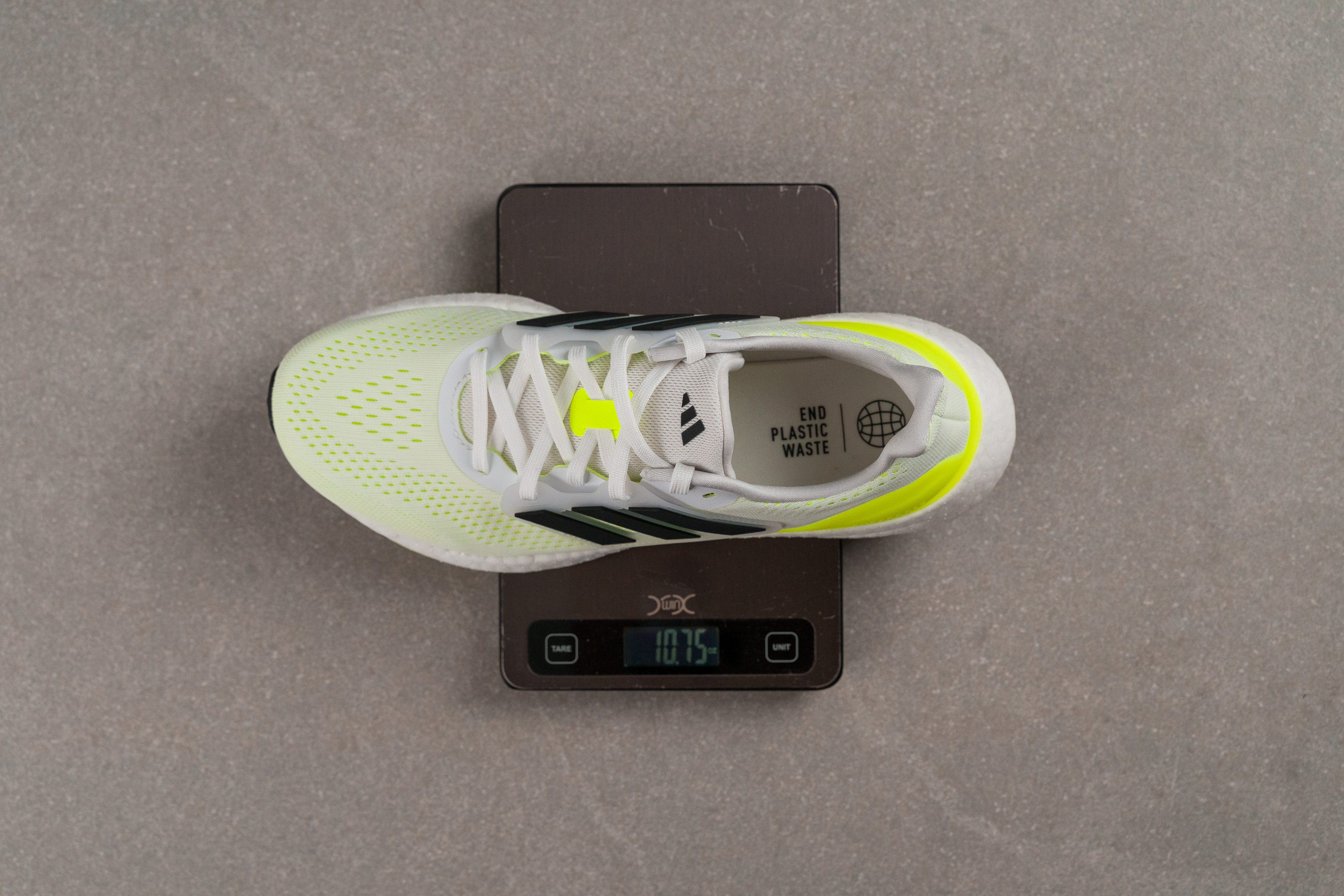
| Pureboost 23 | 10.8 oz (305g) |
| Average | 9.3 oz (264g) |
Breathability
One of the first features to catch our eye about the Pureboost 23 is its upper, generously filled with ventilation holes. This design, in theory, promises superb breathability. However, at RunRepeat, we believe in rigorous testing and concrete proof rather than speculation.
Utilizing our specialized smoke-pumping machine, we evaluated the shoe's breathability in our lab and determined that it deserved a perfect score—5 out of 5.
What makes this achievement remarkable is the shoe's comfort. To counterbalance the potential for heat-related issues, the designers strategically incorporated large ventilation holes, ensuring a cool and airy experience.
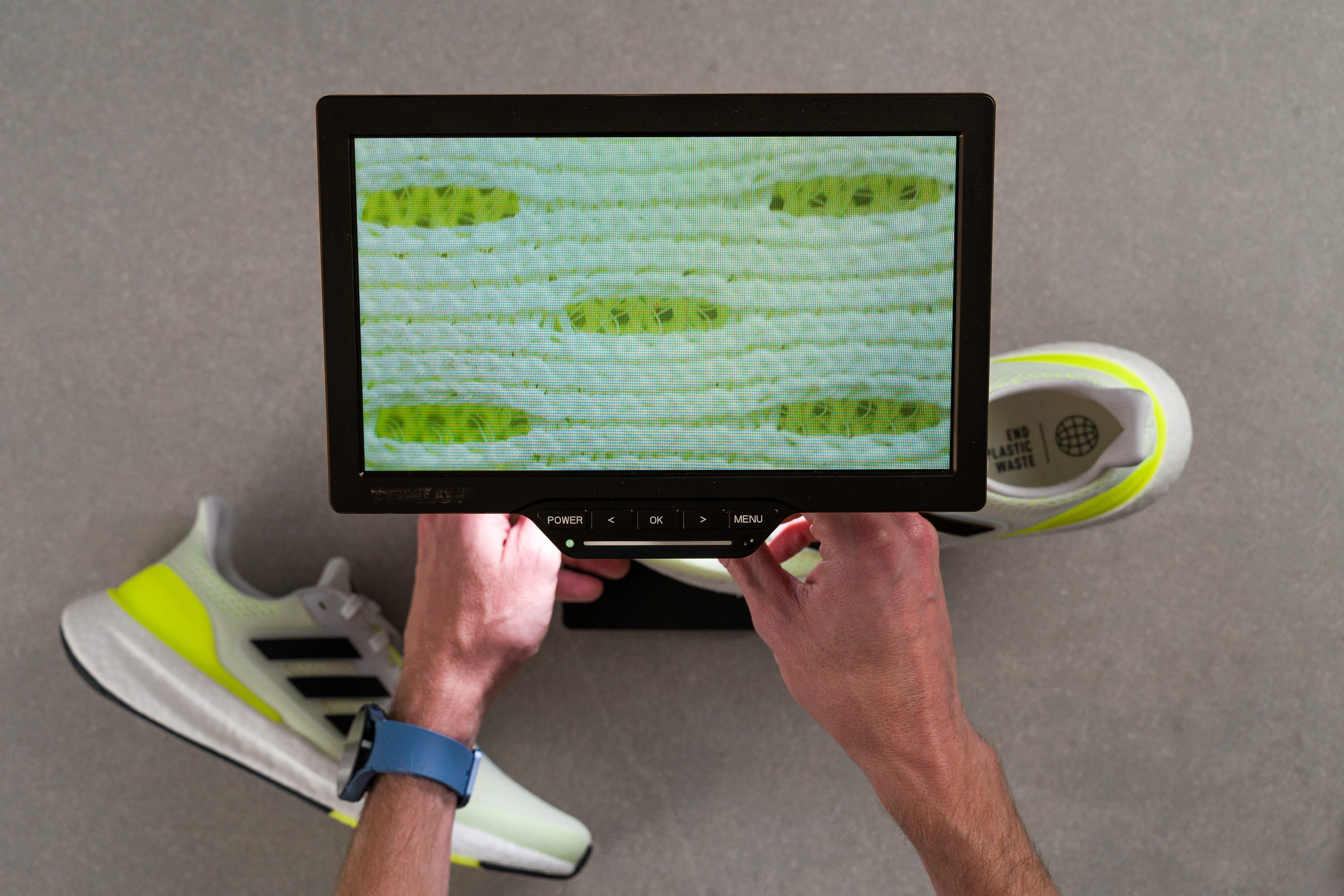
To examine the ventilation holes closely, we placed the shoe under our microscope.
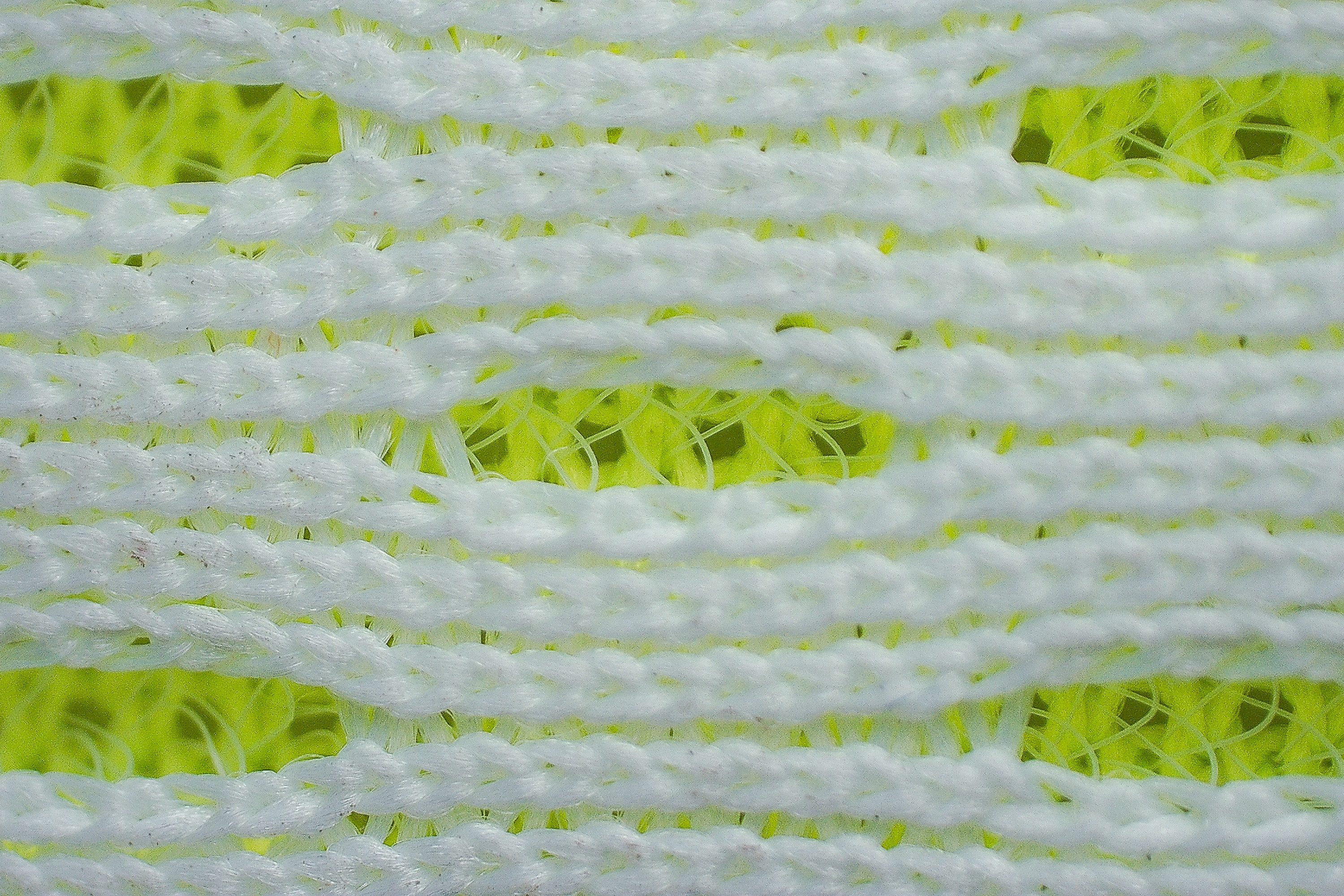
The upper reveals two distinct layers—a white exterior layer with holes every few millimeters, and a well-ventilated yellow layer providing structure.
This results in a winning blend of a cushioned, comfortable, and airy upper, one of the best we've ever tested in a daily running shoe.
| Pureboost 23 | 5 |
| Average | 3.7 |
Stability
Lateral stability test
The Pureboost 23 incorporates two TPU lateral pieces from the Ultraboost design to enhance stability in the heel. When paired with the low stack height and wide platform, this feature elevates the shoe's stability beyond that of many other neutral running shoes.
Torsional rigidity
The low stack height also makes this shoe exceptionally flexible (1/5), contributing positively to everyday comfort.
Indeed, the Pureboost 23 is an versatile choice for individuals seeking a pair suitable for casual runs, gym workouts, and everyday wear.
| Pureboost 23 | 1 |
| Average | 3.5 |
Heel counter stiffness
It's evident that Adidas prioritized enhancing heel stability in this design, as demonstrated by the two TPU pieces in the heel and the notably rigid heel counter, which we scored at 4/5.
Such a feature is uncommon in shoes of this type, yet it promises to greatly benefit those experiencing minor stability concerns.
| Pureboost 23 | 4 |
| Average | 2.9 |
Midsole width - forefoot
During our test runs, the shoe felt notably broad and stable with each landing, including while taking corners.
Upon inspecting the actual dimensions, we indeed discovered a generous width, measuring 115.0 mm at the broadest part of the forefoot.
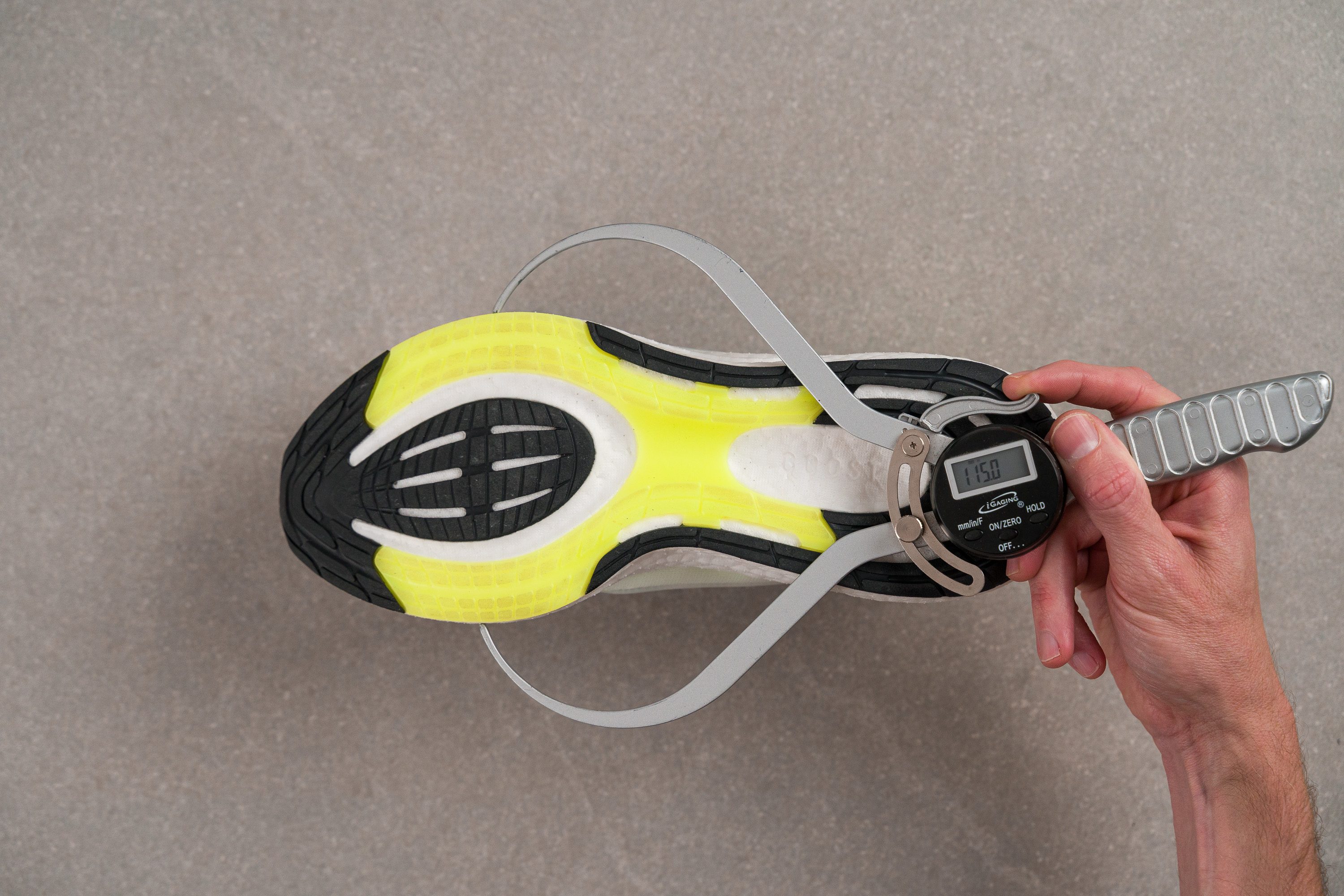
| Pureboost 23 | 115.0 mm |
| Average | 114.4 mm |
Midsole width - heel
The shoe's design also contributes to its width, which, at 92.0 mm, is again broader than that of many running shoes.
This ensures stable landings even for individuals experiencing mild pronation.
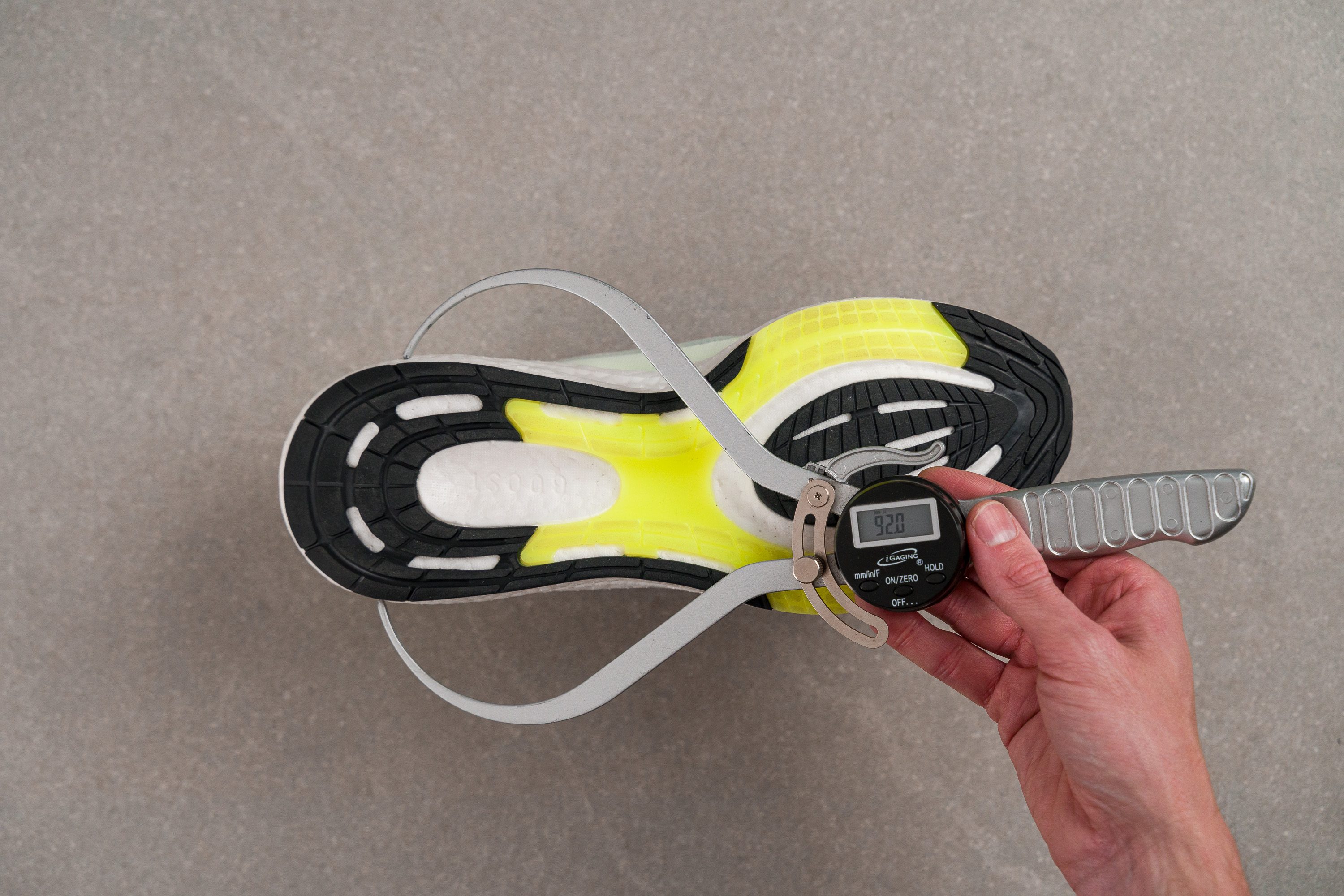
| Pureboost 23 | 92.0 mm |
| Average | 90.6 mm |
Durability
Toebox durability
Shoes that are well-ventilated and achieve this status through large holes often result in less-than-stellar durability, as we experienced with the Adidas Ultraboost 1.0.
However, as we discuss in our guide about running shoe uppers, mesh shoes generally prove more resilient than their knit counterparts. That's why the Pureboost 23 secured a not-so-disappointing score of 2/5.
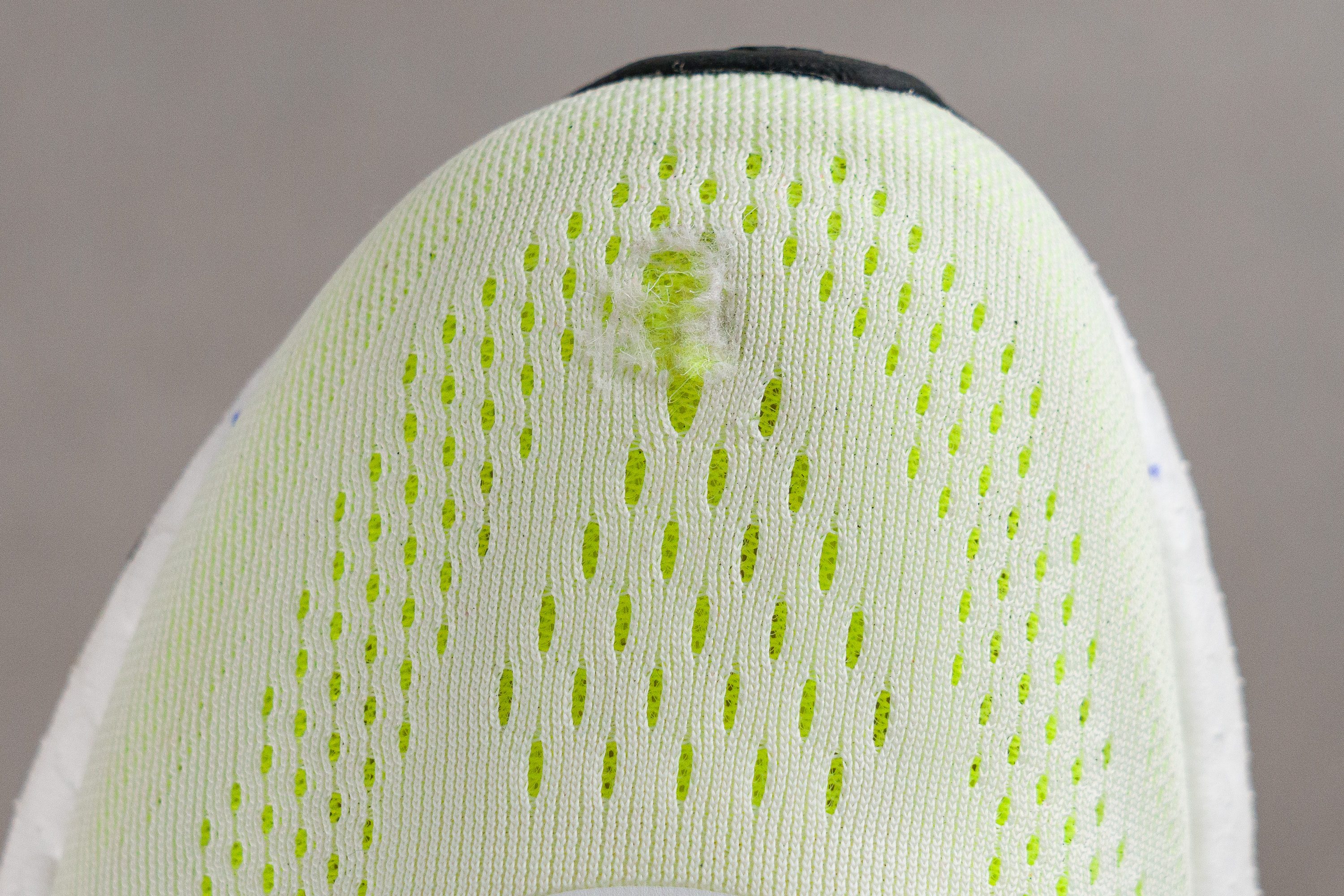
| Pureboost 23 | 2 |
| Average | 2.6 |
Heel padding durability
The heel impressively flips the script, effortlessly earning a perfect score of 5/5.
This means that even runners who typically wear out this area due to their Achilles can confidently rely on this shoe, ensuring a hole-free experience. The contrast when compared to the Under Armour Charged Assert 9 is truly remarkable!
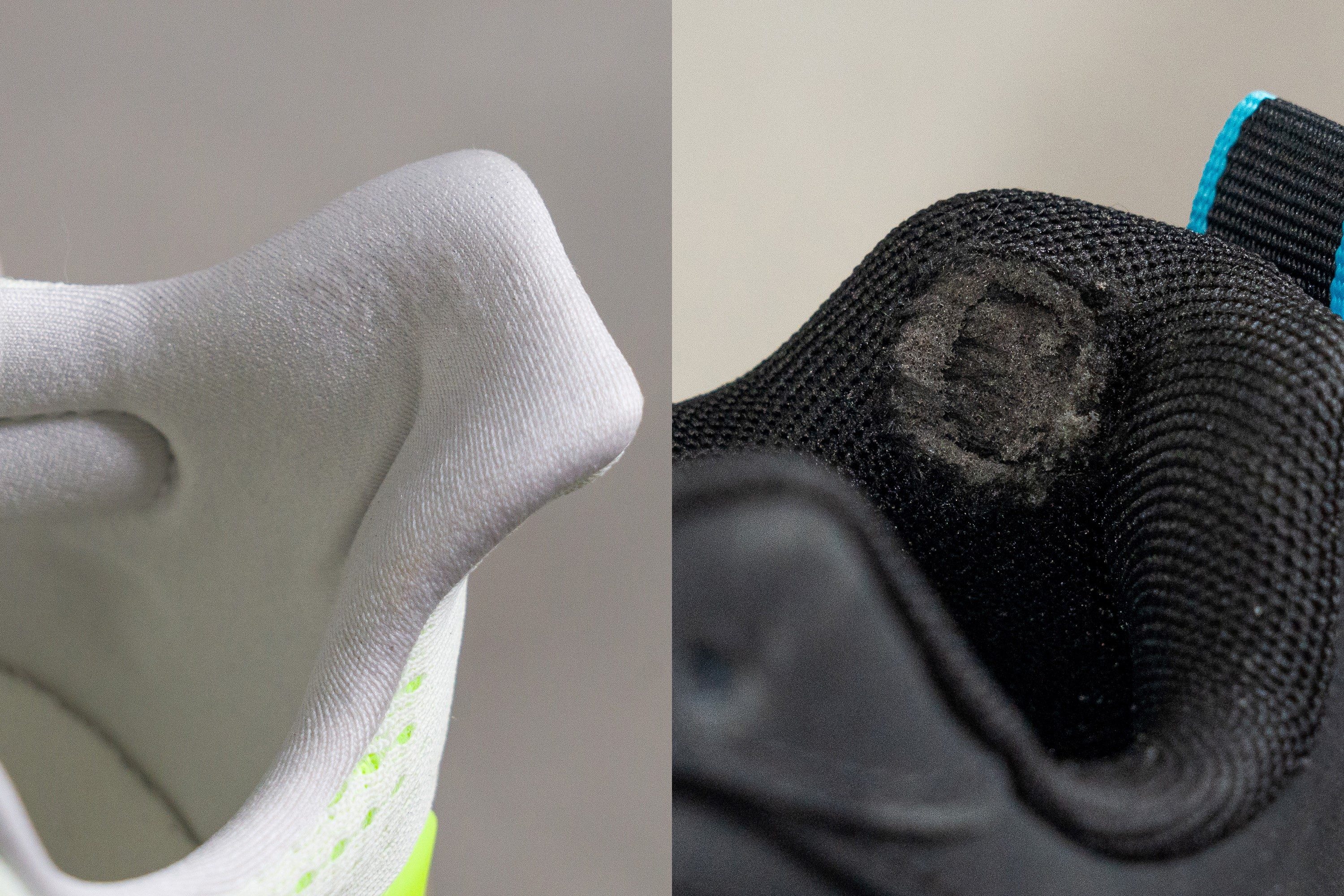
| Pureboost 23 | 5 |
| Average | 3.4 |
Outsole durability
A softer-than-average rubber might suggest compromised durability.
We used the Dremel again, this time in the outsole, as is our standard practice for all running shoes. We observed a 0.9-mm indentation, which, while being an average score, is quite favorable for such a soft, grip-enhancing rubber.
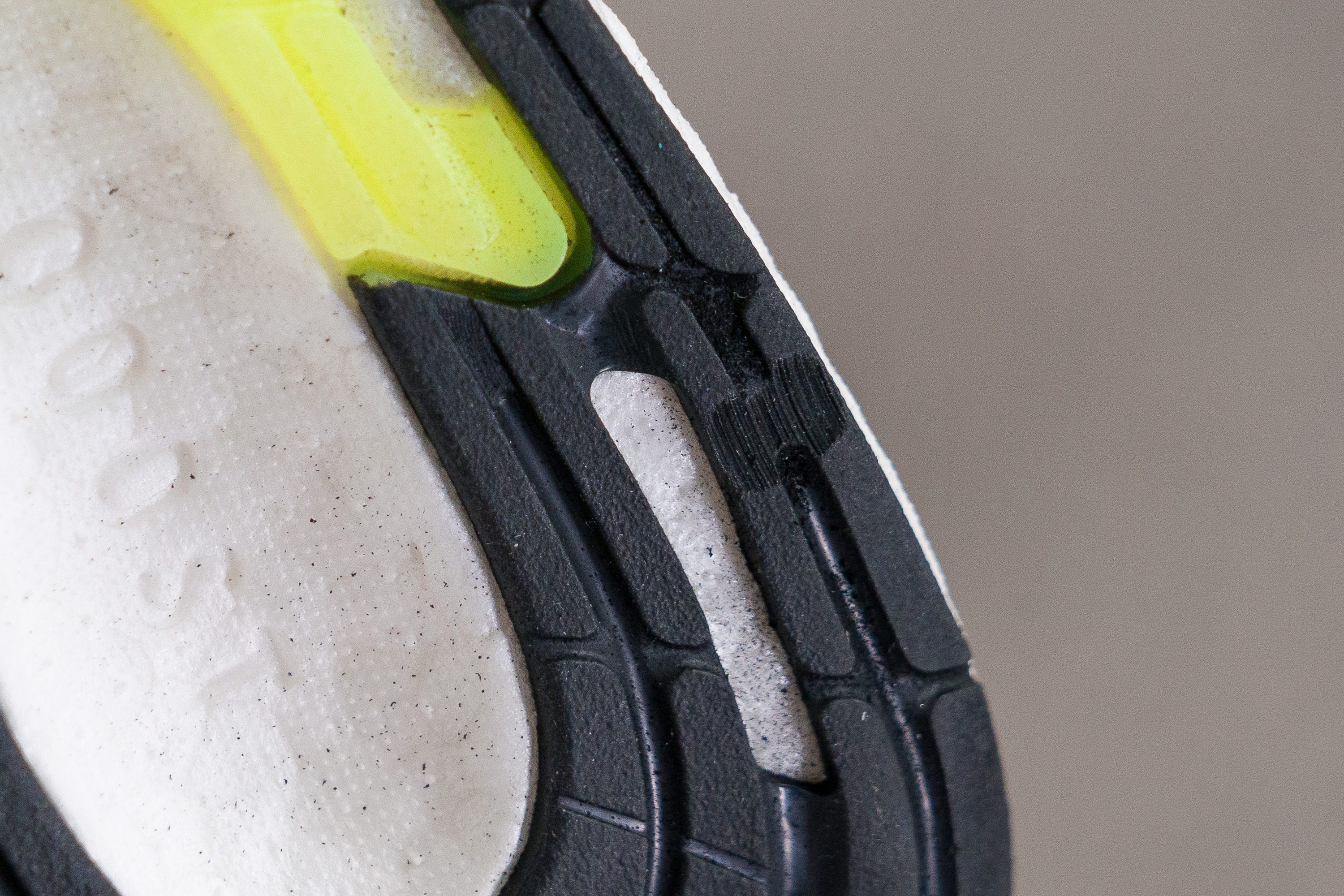
| Pureboost 23 | 0.9 mm |
| Average | 1.1 mm |
Outsole thickness
This is a training shoe, so it should last at least 500 miles for the majority of runners. The 3.0-mm rubber should help to meet that standard.
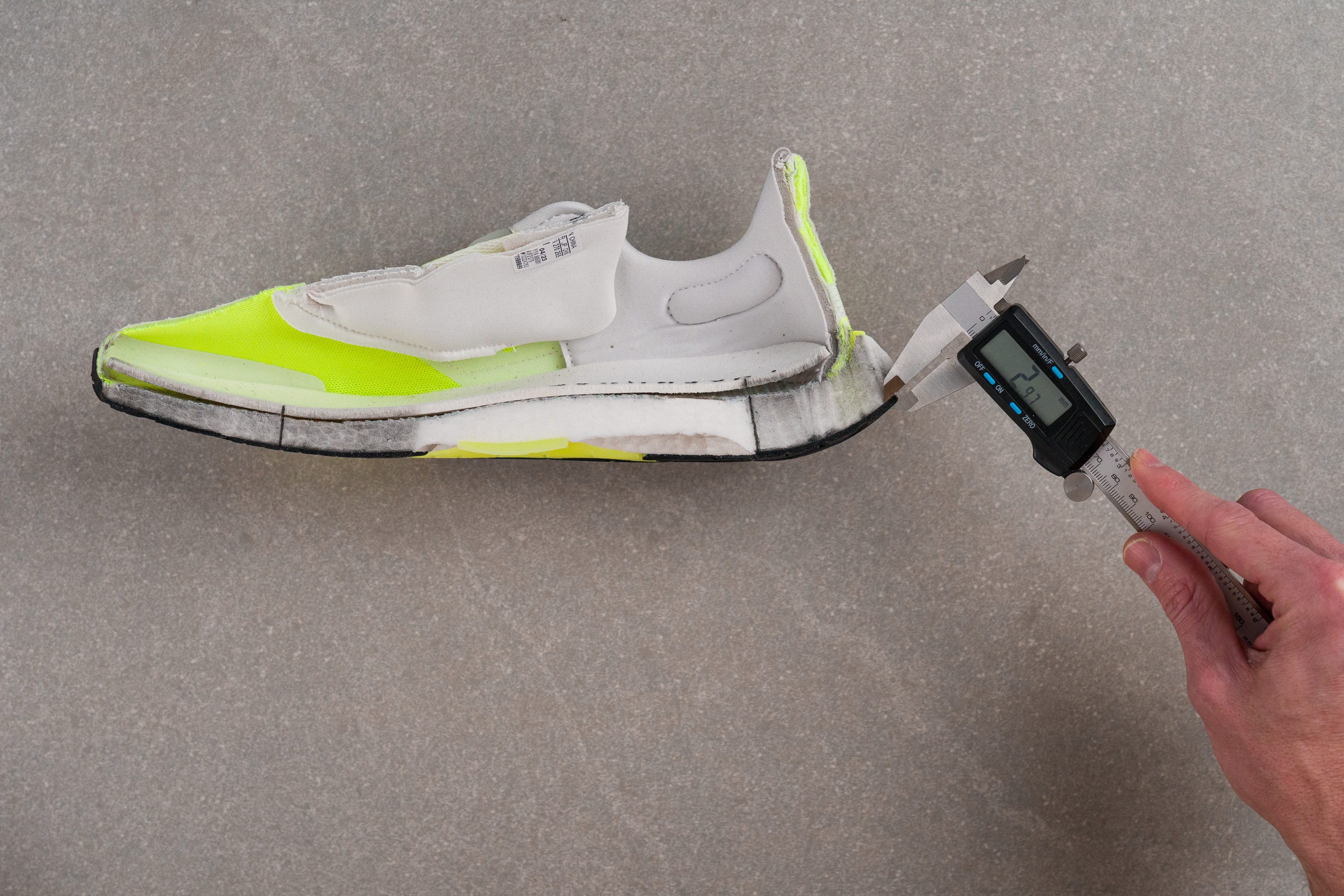
| Pureboost 23 | 3.0 mm |
| Average | 3.2 mm |
Misc
Insole thickness
The insole is really thin, measuring just 3.1 mm. We believe this falls short for this shoe, as adding a bit more cushioning would have been a straightforward fix without significantly affecting the weight.
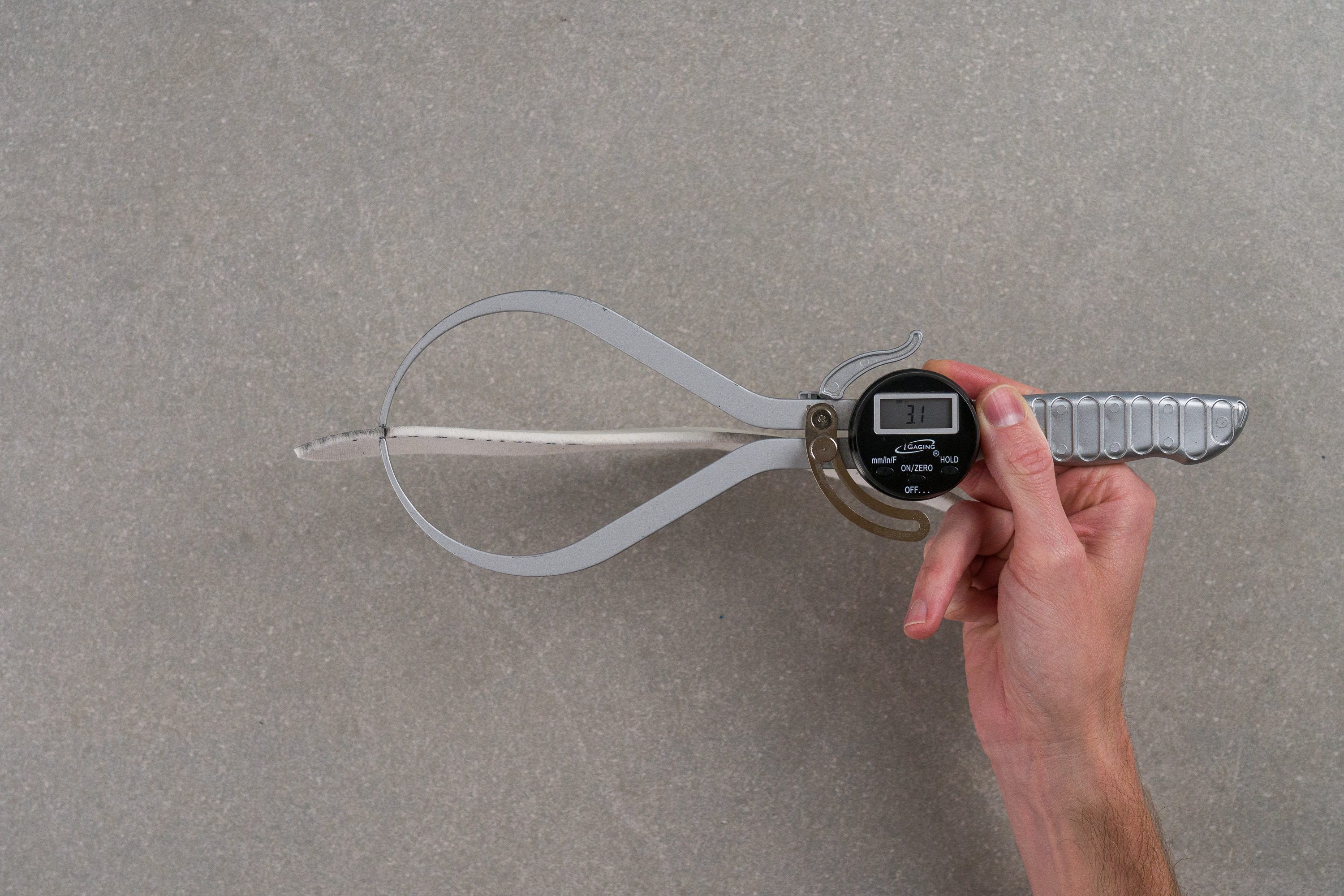
| Pureboost 23 | 3.1 mm |
| Average | 4.5 mm |
Removable insole
The insole isn't glued down, allowing for easy replacement with orthotics or third-party insoles due to the shoe's generous width.
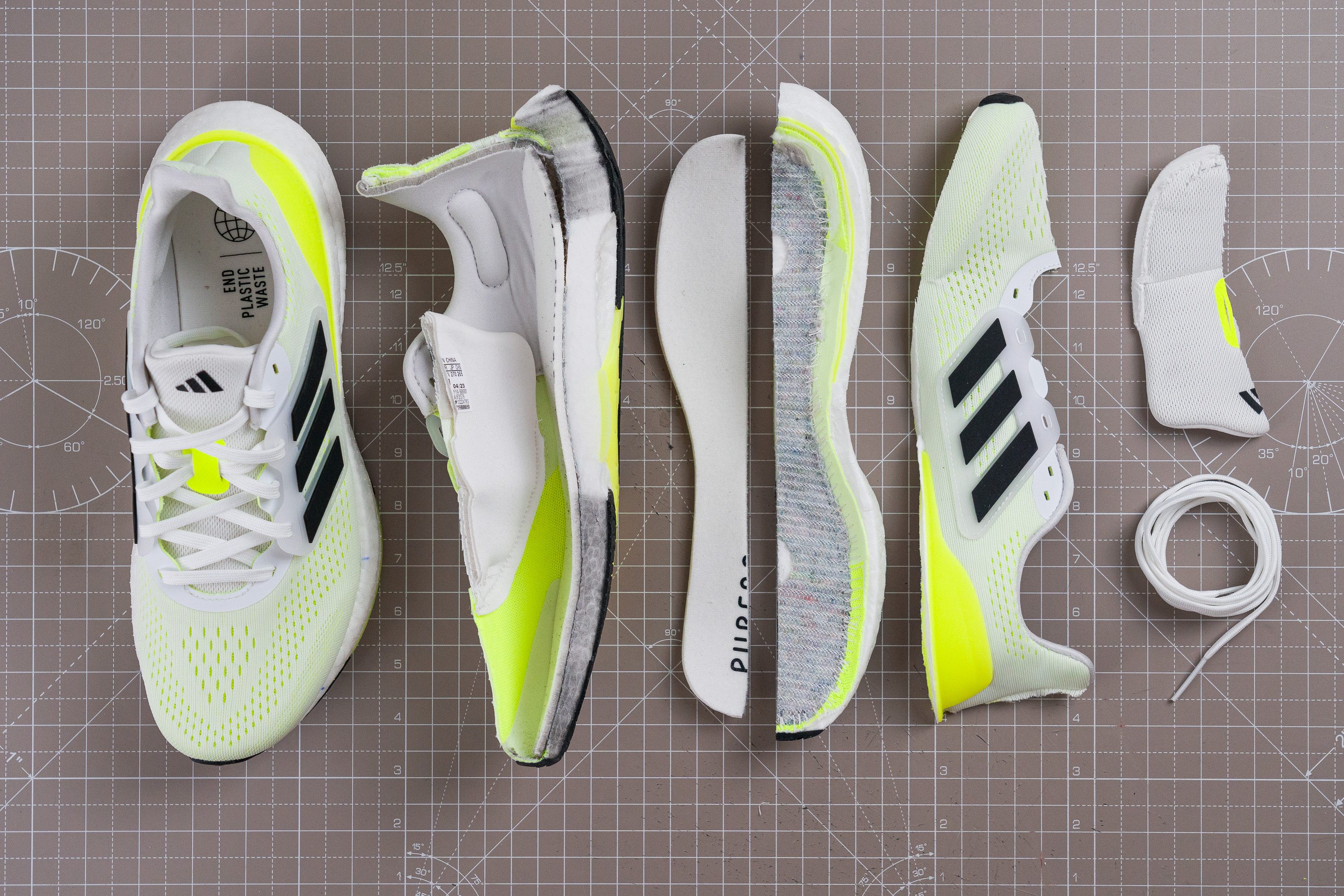
| Pureboost 23 | Yes |
Midsole softness in cold (%)
After chilling the shoe in the freezer for 20 minutes and testing it again, we observed a consistent measurement of just 15.8 HA. This consistency verifies that the Pureboost 23 maintains its softness even in colder conditions.
The variance between the two most recent measurements shows only a 17% increase, surpassing the performance of many other shoes.
However, we must admit that we anticipated this exceptional performance, as the TPU-based Boost is known to excel in winter conditions.
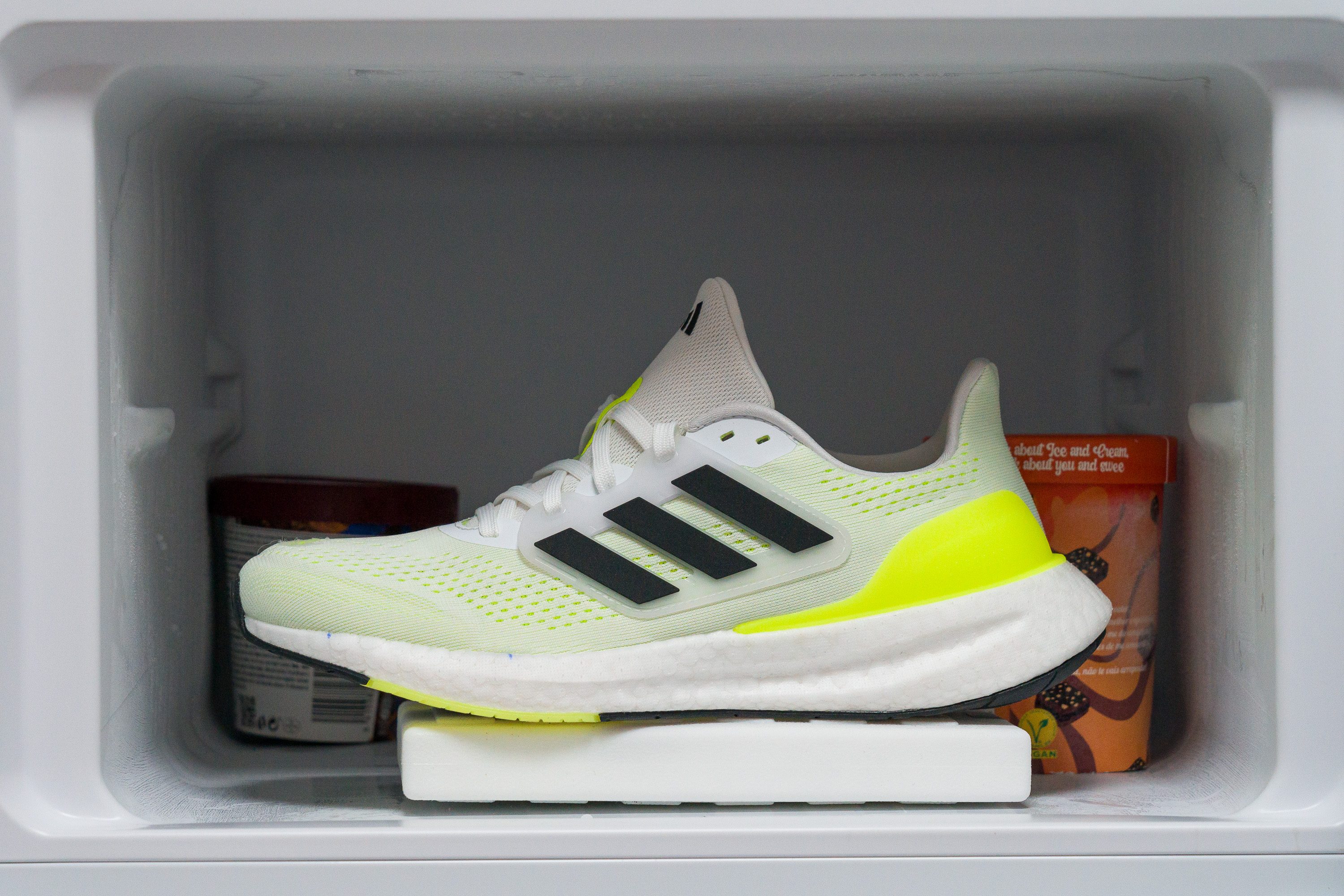
| Pureboost 23 | 17% |
| Average | 24% |
Reflective elements
Regrettably, Adidas neglected to include any reflective elements in the Pureboost 23.
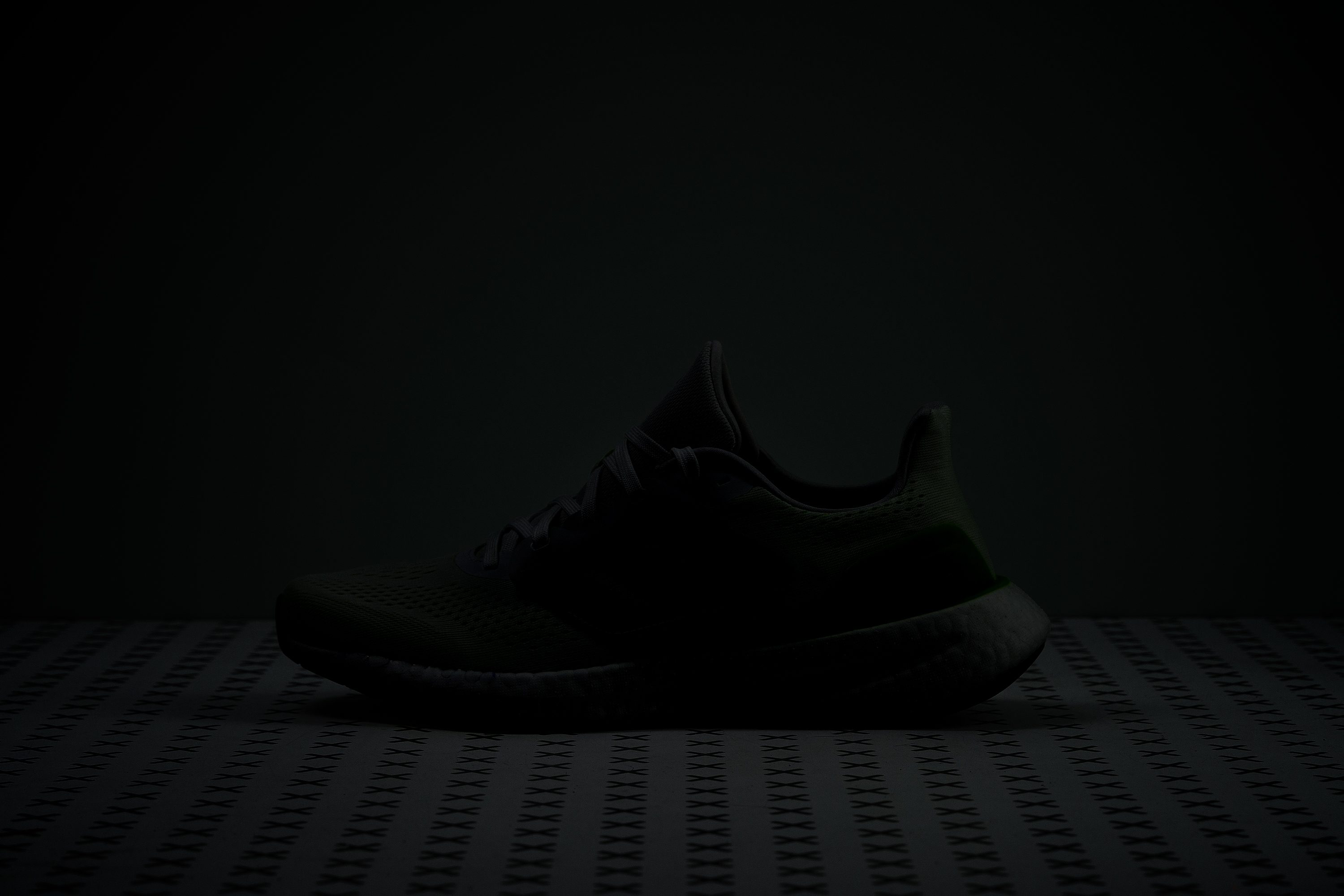
| Pureboost 23 | No |
Tongue padding
We clocked the tongue padding at 4.9 mm, good enough for short or medium-distance runs.
It's comfy, and we believe that any additional padding would have unnecessarily added weight to an already hefty shoe.
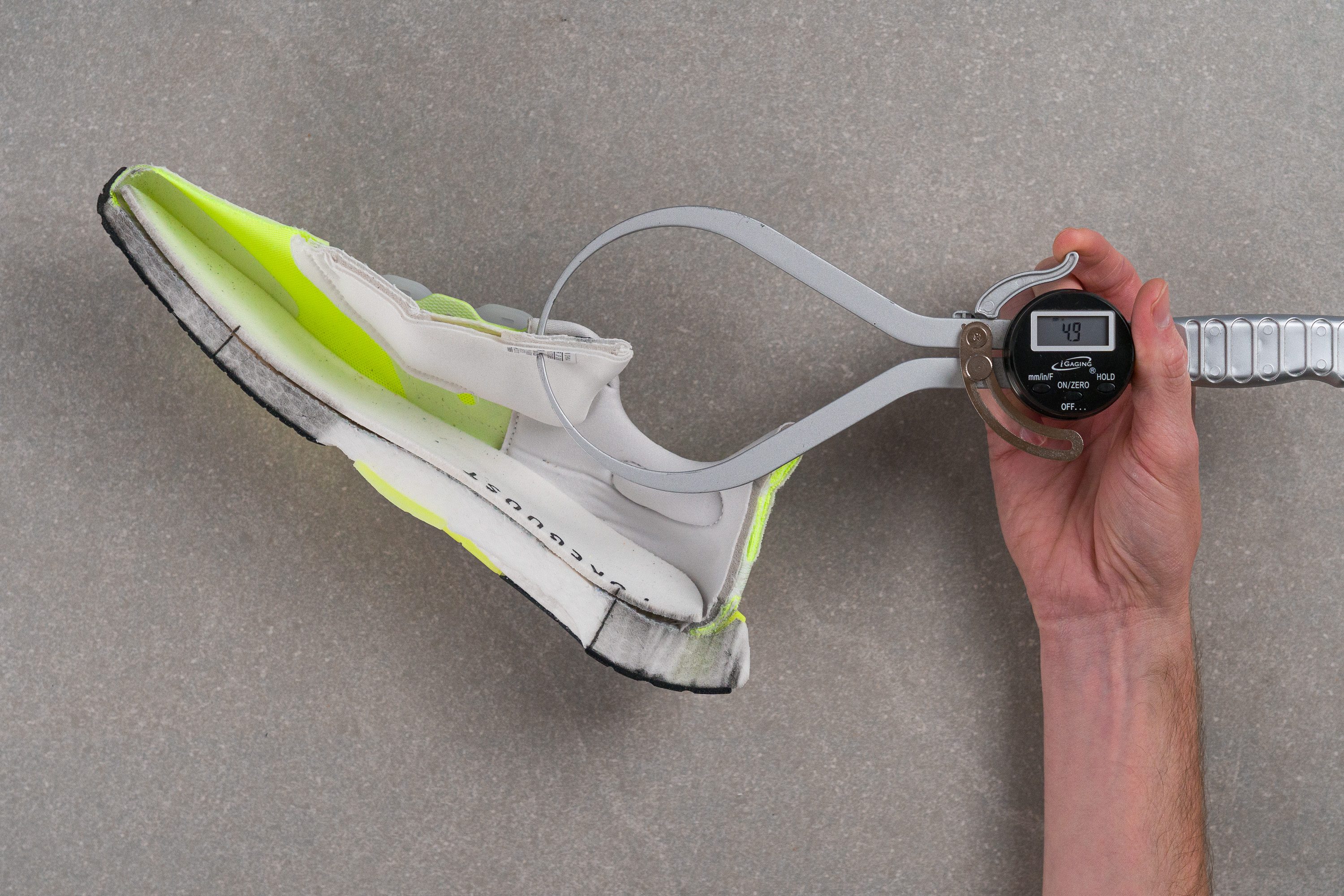
| Pureboost 23 | 4.9 mm |
| Average | 5.7 mm |
Tongue: gusset type
Adidas chose to forgo a gusseted tongue, and although we favor them for enhanced lockdown, they aren't crucial for running at easy paces—those best suited for this shoe.
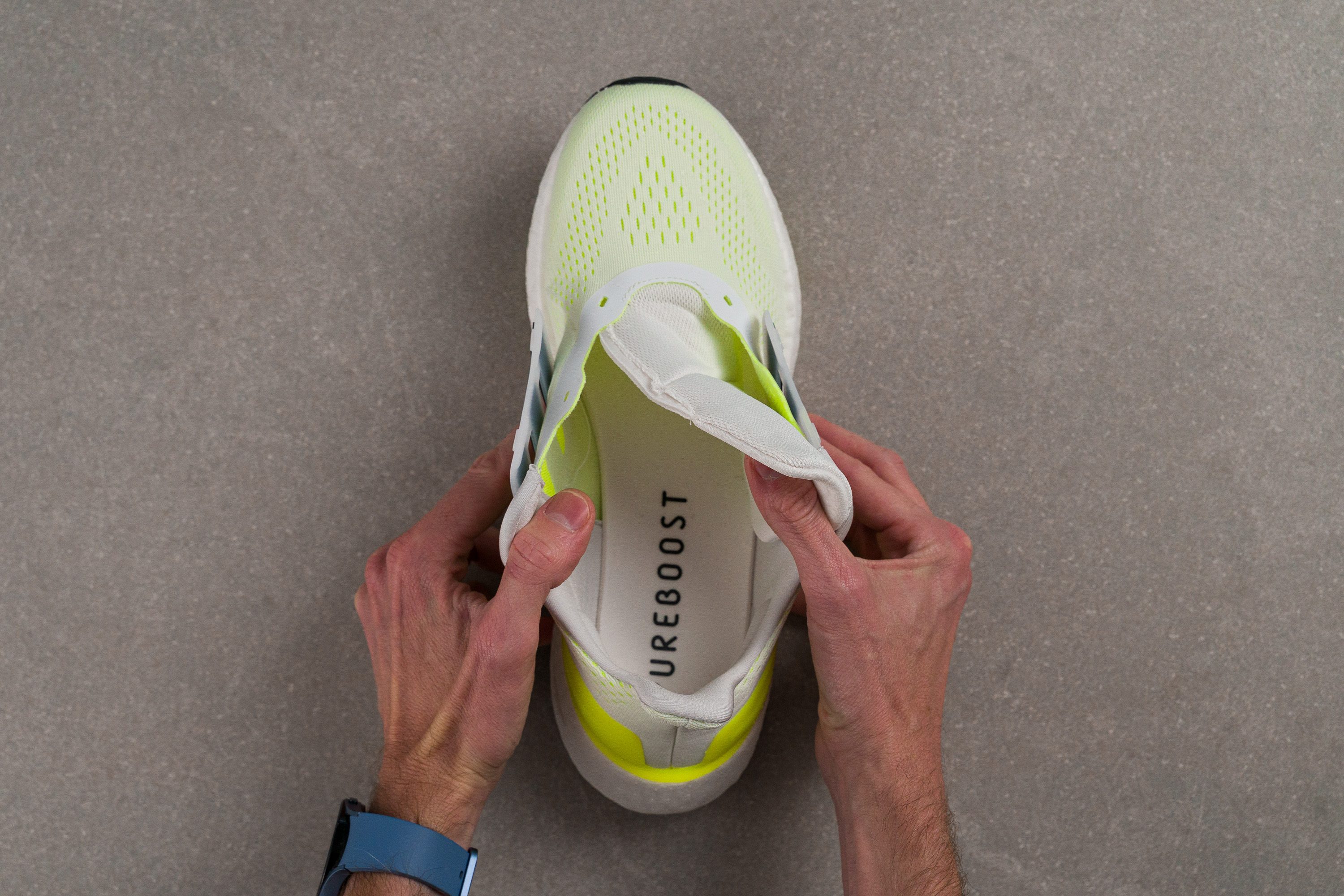
| Pureboost 23 | None |
Heel tab
The heel design, taken from the OG Ultraboost, includes a convenient pull tab that simplifies sliding your feet into the shoe and provides comfort to the Achilles tendon.
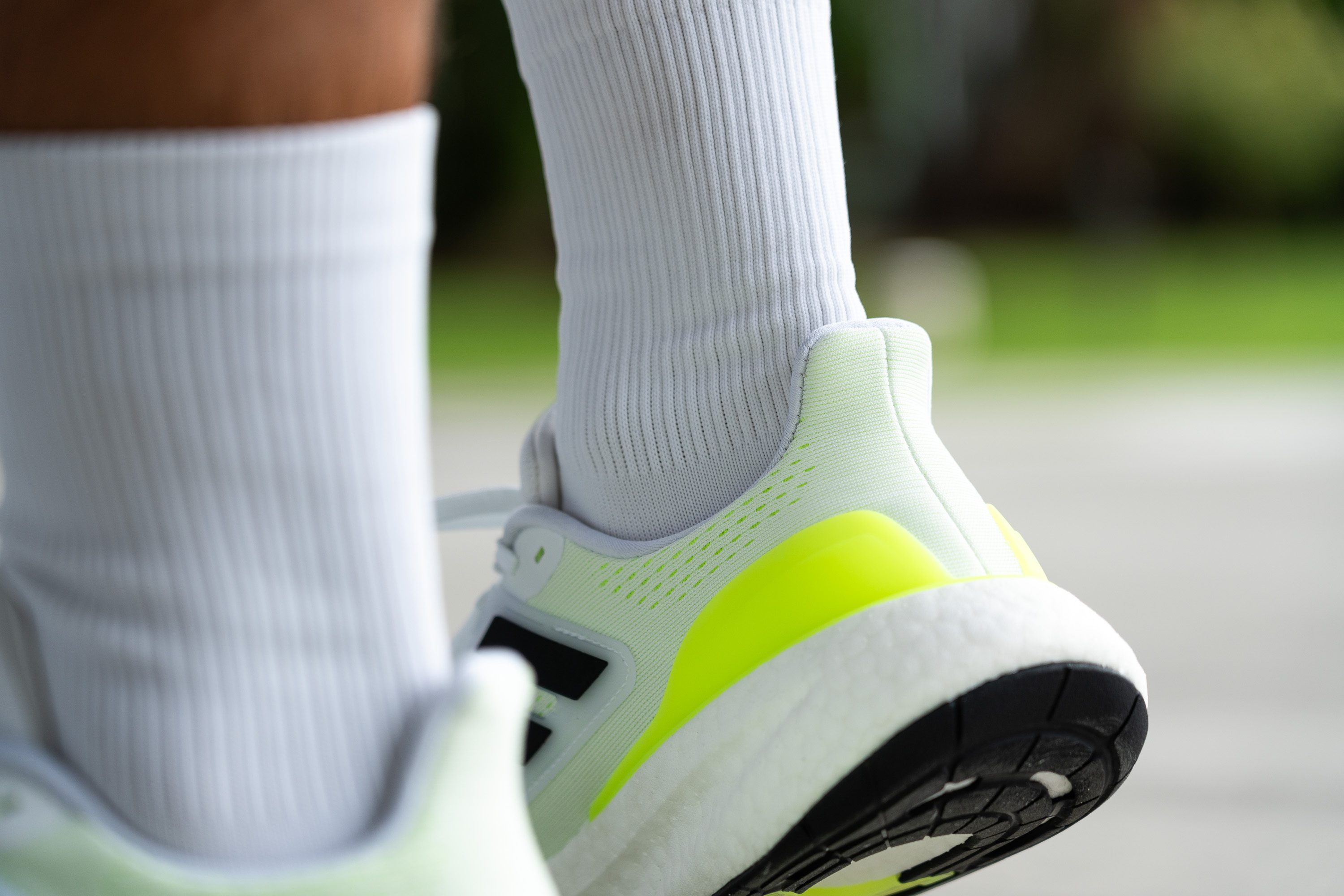
| Pureboost 23 | Pull tab |

